Revolution #368, January 5, 2015
(revcom.us)
Voice of the Revolutionary Communist Party, USA
Please note: this page is intended for quick printing of the entire
issue. Some of the links may not work when clicked, and some images may be missing.
Please go to the article's permalink if you require working links and images.
- 2014: A Momentous Year... Fight the Power, and Transform the People, for Revolution
- 2014: The Year in Review
- Protest Reports: NO NEW YEAR UNDER THIS OLD SYSTEM!
WE CAN'T BREATHE!
- Interview with Sunsara Taylor: Stop the War on Women—Protest in DC and San Francisco in January!
- Sunsara Taylor & Carl Dix on Confronting the Anti Abortion Woman Haters January 22 & 24, 2015
- Conclusion of the Opening Presentation by Bob Avakian at the November 15 Dialogue with Cornel West at Riverside Church in New York City
- The Time Is Now!
Experience, dig into, spread, and support this Dialogue getting out in the world
- Transgression and Convergence, Infectious Chemistry and Serious Urgency: Reflections on REVOLUTION AND RELIGION: The Fight For Emancipation and the Role of Religion—A Dialogue Between Cornel West and Bob Avakian
- Making the Absolute Most Out of an Incredible Dialogue
- Serious About Making an Actual Revolution
Bob Avakian
- Questions from the Audience at the Dialogue Between Cornel West and Bob Avakian
- From a Reader: This Type of Dialogue Is Desperately Needed
- The Senseless, Illegitimate Police Killing of Mayra Cornejo
- San Francisco Bay Area, New Year's Eve
- Clyde Young (Wayne Webb), 1949-2014—A Life Lived for the People...
and Full Emancipation
- Re-Colonization in the Name of Normalization: Behind the Re-Establishment of U.S.-Cuba Diplomatic Relations
- NYC—24-Hour Action at Grand Central Station:
Police Brutality Is Deadly
- Los Angeles: Marching Against the Police Murders of Omar Abrego and Ezell Ford
- Taking Bob Avakian and Cornel West Dialogue to a New Year’s Eve Party
- Confront the Anti-Abortion, Woman-Hating Fascists and Reach Out Everywhere to Get Others to Do the Same!
Strategic Thoughts on Building the Movement for an Actual Revolution That Breaks ALL the Chains
- Black Lives Matter LA Encampment for Ezell Ford Targeted by LAPD
- Los Angeles: Marching to Demand Justice for Mayra Cornejo
- From A World to Win News Service
Permalink: http://revcom.us/a/368/2014-a-momentous-year-fight-the-power-and-transform-the-people-for-revolution-en.html
Revolution #368 January 5, 2015
2014: A Momentous Year...
Fight the Power, and Transform the People, for Revolution
January 5, 2015 | Revolution Newspaper | revcom.us
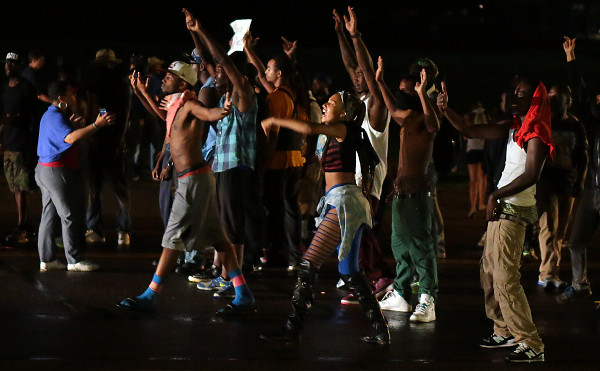
Ferguson, August 17, 2014. AP photo
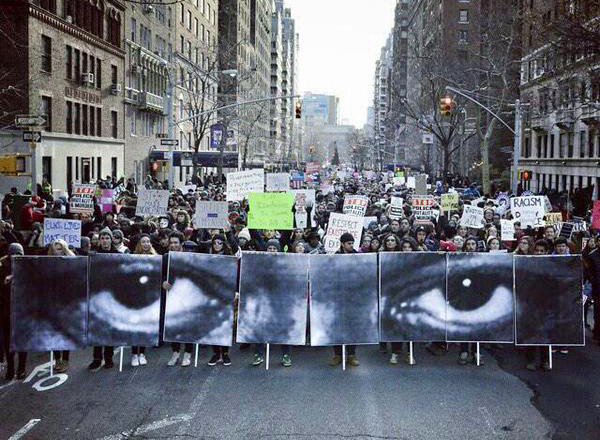
New York City, December 12, 2014. Posters of the eyes of Eric Garner by French artist JR are carried in a march of thousands. Photo: Special to revcom.us/Revolution
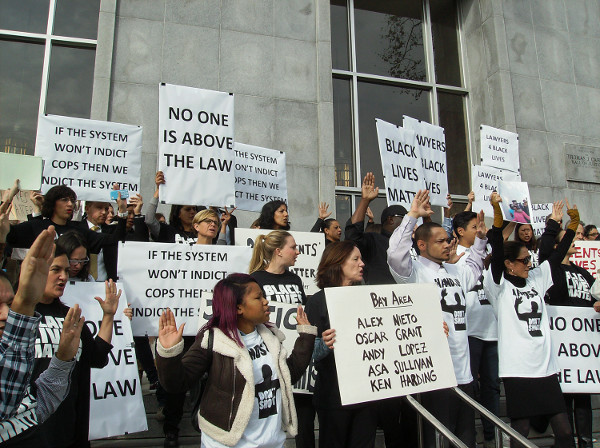
San Francisco public defenders, December 18, 2014. Photo: Special to revcom.us/Revolution
2014 was a momentous year. As summer turned to fall, long-suppressed outrage burst into a massive struggle against police murder. The courageous, defiant protest that erupted in Ferguson, Missouri, after the system murdered Michael Brown, spread coast-to-coast after a grand jury exonerated the cop who killed him. That, and new outbreaks of outrage and resistance—as the system continued to murder Black people with impunity—involved tens and even hundreds of thousands from all walks of life. The struggle affected the thinking of tens of millions. “The whole world was—and IS—watching!” A new spirit of resistance emerged and caught fire.
And, as this upsurge was gaining momentum and preparing to make a new leap, 1,900 people came out to the Dialogue on “Revolution and Religion: The Fight for Emancipation and the Role of Religion,” between Bob Avakian (BA) and Cornel West. BA put forward a full-out, vibrant message of revolution. Cornel West and Bob Avakian engaged one of the most important questions of our time, coming from different philosophical frameworks, struggling for morality that refuses to accept the horrors that this system rains down on people and to act with a moral courage that these times demand. They fought for people to see the need for radical, revolutionary change with a spirit of invitation, openness, and unity.
The upheaval around police murder, along with other important struggles—including against the whole war on women—and with the message of revolution being powerfully brought out both within these struggles and more broadly in society—all this and more could develop into the first steps toward an actual revolution. Not guaranteed, but possible.
There are all kinds of work—including all kinds of organizing—to do to bring that about. The movement that grew up against the outrageous whitewashes of police murder this year itself faces deep and serious challenges, right now—confusion spread by the system, repression, and other challenges which have to be met by seizing the deeper opportunities to go higher and bigger. And there is a larger, deeper transformation that has to go on overall—of the terrain, of the people, and of the vanguard. The spirit of bold and daring struggle has to spread to other sections of society, other social movements. With that, and in relation to that, the solution of revolution—and in particular the revolution as it has been re-envisioned by Bob Avakian—has to become much more powerfully part of the terrain of people’s thinking, and the movement for revolution has to grow in influence and organization, on all different levels.
Revcom.us/Revolution has to more and more be the guide, the pivot, the crucial tool in drawing forward, orienting, training, and organizing thousands, and influencing millions—fighting the power, and transforming the people, for revolution. And the vanguard leadership for revolution needs to be strengthened. If you don’t know much about the Revolutionary Communist Party or are just learning about it, learn more as you work with the Party... if you are close, get closer... if you are in, step up your level.
All this can be done and it must be done. With that as our message, we give New Year’s greetings to our readers! Take a minute to review the struggles of the past year... and then prepare to go much further in the year ahead, making real leaps toward the time when millions can be led to go for revolution, all-out, with a real chance to win.
Permalink: http://revcom.us/a/368/year-in-review-ferguson-en.html
Revolution #368 January 5, 2015
2014: People in Ferguson Rise Up! The Upsurge Spreads
January 5, 2015 | Revolution Newspaper | revcom.us

Ferguson, August 17, 2014. Photo: AP
See slide show from Ferguson
The murders by police this past summer of Eric Garner and Michael Brown—along with murder after murder after murder of other unarmed Black and Latino men, women and children during these past months—and then the exoneration of the killers are, in one horrific sense, nothing new. These monsters have been doing this for years, and for years the system has let them walk.
But this time things changed. People in Ferguson, Missouri—the everyday people in the streets—rose up against the murder of Michael Brown and refused to back down in the face of violent repression. In doing so, they forced the world to wake the hell up. Around the country, and beyond, tens of thousands of people have poured into the streets from classrooms, housing projects, campuses, churches, and workplaces—blocking bridges and freeways, defying threats and arrests, and disrupting “business as usual.” Artists, entertainers, and athletes are speaking out.
What had been an outrage that oppressed people had been forced to learn to accept—however bitterly—and that other people had learned to ignore or shrug off, became intolerable. The inspiring and powerful movement that has begun to emerge in the wake of the uprising in Ferguson needs to spread and intensify.
Permalink: http://revcom.us/a/368/year-in-review-dialogue-en.html
Revolution #368 January 5, 2015
2014: Dialogue between Cornel West and Bob Avakian: An Unprecedented Event
January 5, 2015 | Revolution Newspaper | revcom.us
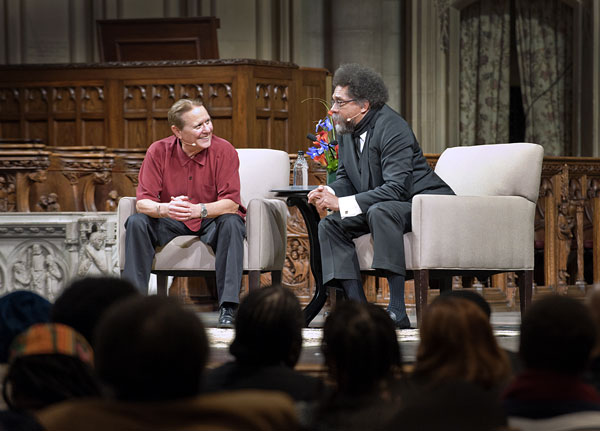
Photo: revcom.us
The Dialogue on November 15 at Riverside Church in New York City between Bob Avakian and Cornel West—"Revolution and Religion: The Fight for Emancipation and the Role of Religion" was a truly unprecedented event. Nearly 2,000 people packed one of the most famous churches, one of the most prominent and historic venues in the country, to experience—live and in person—Bob Avakian in dialogue with Cornel West. It was the first public appearance in decades by Bob Avakian, the revolutionary leader and architect of a whole new framework for the emancipation of all of humanity, who spoke directly and in depth to the need and basis for revolution; in dialogue with Cornel West, one of the most important and provocative public intellectuals of our time and who spoke and engaged in dialogue from the perspective of Christian and Black prophetic traditions, and as an uncompromising champion for the oppressed.
People came from New York, Ferguson, Chicago, as far away as Hawai'i—and included people from the housing projects, the high schools and college campuses, the religious communities, the arts, the front lines of political struggle, and more.
The audience experienced a substantial, electrifying presentation by BA, a revolutionary leader who was completely on fire with both the scientific understanding and visceral feeling that the world doesn't have to be this way, that people don't have to live this way, that a radically different world is possible, and who has a plan for how to get to that world. Thousands of people got an up-close and personal introduction to Bob Avakian, everything he's about, and the revolution that he's leading, and an up-close and personal invitation and challenge to step forward and be part of this revolution.
After BA spoke, the audience experienced an impassioned exposition of a revolutionary Christian approach to changing the world from Cornel West, his point of departure being the cross and the meaning of the cross in the story of Jesus and especially in Black people’s lives, while doing so in the context of a passionate call for and unity based on integrity, honesty, and commitment to struggle that stems from a deep love for “the least of these” and a deep calling to end injustice.
The presentations were followed by an extremely warm, principled, provocative, thoughtful, and moving exchange, which included speaking to questions from the audience, and exploration of key points of unity and disagreement on the major themes of revolution, religion, and human emancipation, along with a wide range of burning questions related to those themes.
Watch a re-run of the livestream video of the entire event at www.revcom.us
Permalink: http://revcom.us/a/368/year-in-review-climate-change-en.html
Revolution #368 January 5, 2015
2014: Climate Change... Change Everything
January 5, 2015 | Revolution Newspaper | revcom.us
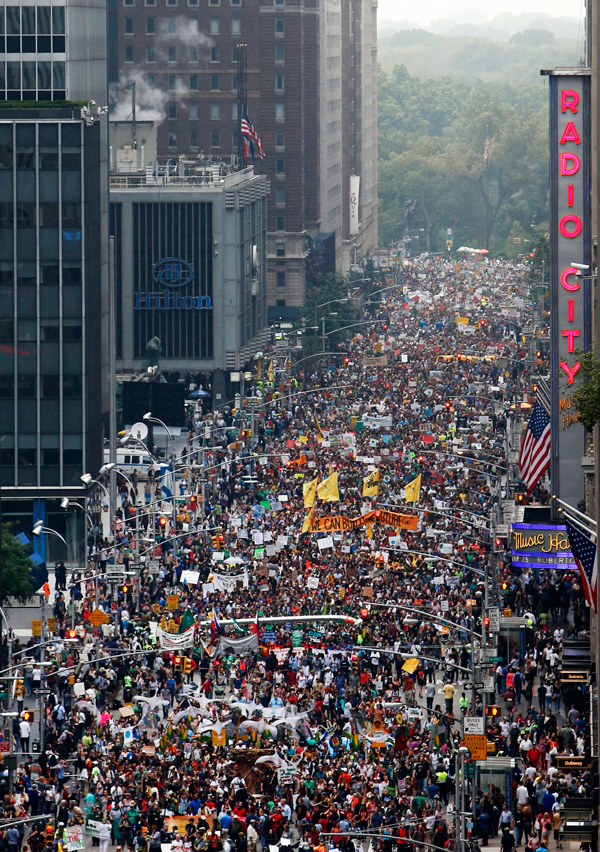
People's Climate March, September 21, 2014, New York City. Photo: AP
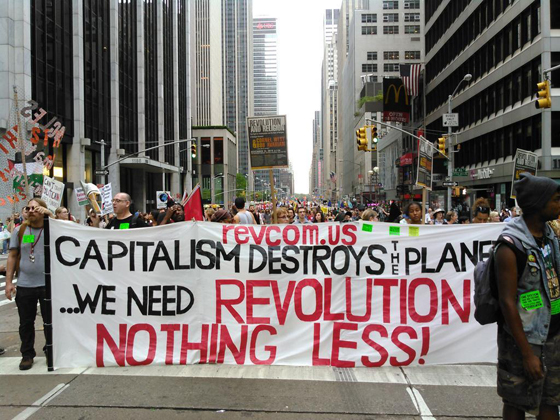
"Capitalism is Destroying the Planet, We Need Revolution Nothing Less" contingent at People's Climate March. Photo: Special to Revolution.
Climate change, driven in large part by capitalism’s addiction to fossil fuels, is accelerating toward a catastrophe that will hit the poorest people on the planet the hardest. The year 2014 was the hottest in recorded history. On September 21, hundreds of thousands joined the People’s Climate March in New York City behind the call to “change everything,” and to “bend the course of history.” As the global powers trumpet agreements that do not really touch the problem, there is a real and urgent question posed: What kind of change is necessary to reverse and also to confront irreversible environmental devastation?

Climate change is already causing more extreme storms and sea level rise. The changing climate is caused by the buildup in Earth's atmosphere of greenhouse gases from the burning of fossil fuels, deforestation and other practices driven by the capitalist system. Above, Bangladesh flooded during monsoon season. Photo: AP
Permalink: http://revcom.us/a/368/year-in-review-abortion-rights-freedom-ride-en.html
Revolution #368 January 5, 2015
2014: Abortion Rights Freedom Ride: GROUND ZERO TEXAS
January 5, 2015 | Revolution Newspaper | revcom.us
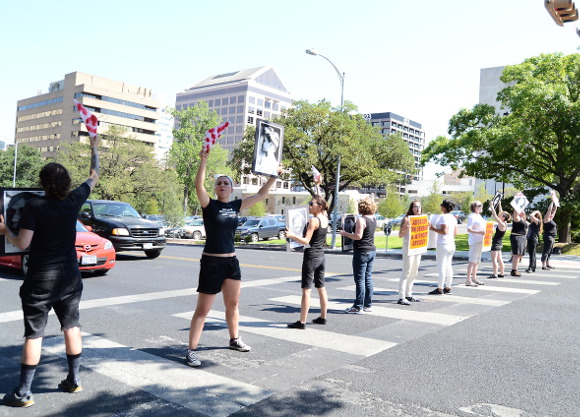
At the Texas Governor's mansion, Austin, Texas, August 13. Photo: Special to revcom.us/Revolution
The Abortion Rights Freedom Ride was a six-week project of Stop Patriarchy this past summer that brought dozens of volunteers, ages 17-71 from around the country to Texas, the front line of the nationwide battle over abortion rights. They held weekly People's Hearings, conducted protests, reached out to thousands on the ground and millions through support statements from prominent people in the arts and politics, major coverage in mainstream, Spanish language, and alternative media with the basic truth: Forced Motherhood Is Female Enslavement. Women need: Abortion On Demand and Without Apology! The Abortion Rights Freedom Ride culminated in a Week of Defiance August 25-Sept 1 that included arrests at the University of Texas and in front of the mansion of Christian fascist Texas Governor Rick Perry.
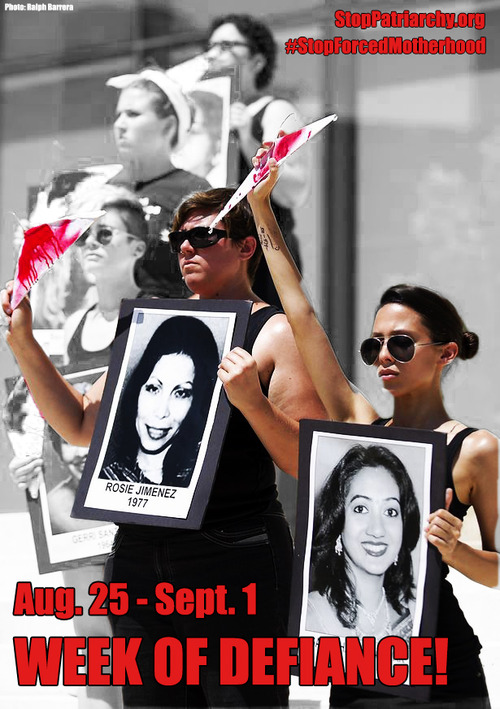
The Abortion Rights Freedom Riders braved the blazing August heat, arrest and police brutality. And they had to go up against attacks not only from anti-abortion forces but also from some very vicious "pro-choice" forces, in order to resist the greatest round of abortion clinic closures to hit a single state since Roe v. Wade legalized abortion in 1973. Because of the ride, not only did the bold and uncompromising message, "Abortion on Demand and Without Apology," reach millions, but many people throughout Texas stepped forward to join in speaking out and standing up to resist. A new path of uncompromising resistance was carved out in opposition to the conciliation and capitulation to the anti-abortion fascists who have characterized the Democratic Party and those pro-choice forces who have subordinated themselves to the Democrats. This is tremendously significant and a profound accomplishment to build from.
Heading into the new year, it is more critical than ever that the lessons and the accomplishments of the Abortion Rights Freedom Ride be built upon and that truly mass independent political resistance be built to STOP this war on women. Stop Patriarchy is mobilizing mass protests on both coasts for the anniversary of Roe v. Wade January 22 in Washington, D.C. and January 24 in San Francisco under the slogan: "Abortion On Demand and Without Apology!"

The Abortion Rights Freedom Ride reached millions with the message of Abortion On Demand and Without Apology
Permalink: http://revcom.us/a/368/year-in-review-torture-en.html
Revolution #368 January 5, 2015
2014: Torture Crimes Exposed and Covered Up
January 5, 2015 | Revolution Newspaper | revcom.us
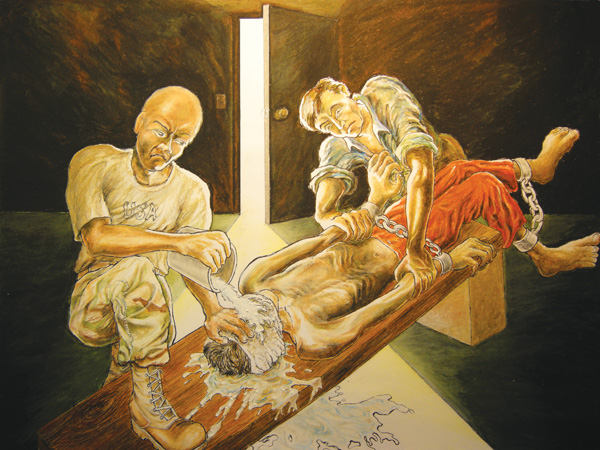
Illustration: Asterio
On December 9, a Senate committee issued a report on CIA torture after 9/11. Whitewashed and censored, it still painted a picture of the most sadistic, depraved, widespread torture intended to instill terror and enforce the interests of the U.S. empire. The report and ensuing “debate” in mainstream news imposed terms that torture is okay if it “saves American lives,” produces “useful intelligence,” and is in the “national interest of the United States.” Those are immoral terms. The interests of rulers of the United States are the interests of a global empire of exploitation and oppression. American lives are not more important than other people’s lives. And nothing justifies torture.
Permalink: http://revcom.us/a/368/year-in-review-gaza-en.html
Revolution #368 January 5, 2015
2014: Israel's Genocidal Assault on Gaza
January 5, 2015 | Revolution Newspaper | revcom.us

Palestinians watching as others carry a body from the rubble of a house destroyed by an Israeli missile strike in Gaza City, July 21, 2014. Photo: AP
Starting in July, Israel—with full backing from the rulers of the U.S.—massacred over 2,100 Palestinian people in Gaza, including hundreds of children. The assault was an escalation of Israel's genocidal ethnic cleansing of Palestine and provoked outrage around the world, including protests on campuses around the U.S. and a growing movement for boycott, divestment, and sanctions against Israel. The question is sharply posed: Is the lesson of the Nazi holocaust that never again will my people be fucked with, even if that means carrying out horrific crimes and genocide? Or is it that never again must these kinds of crimes be carried out anywhere, by anyone?
Permalink: http://revcom.us/a/368/year-in-review-ebola-en.html
Revolution #368 January 5, 2015
2014: Ebola: American Lives are NOT more important than other people's lives
January 5, 2015 | Revolution Newspaper | revcom.us
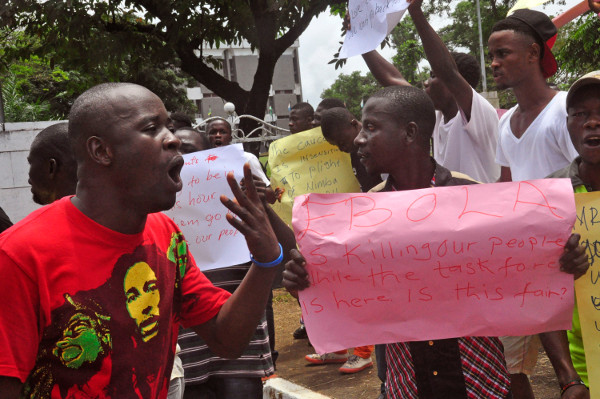
Outside the Liberian House of Representatives, people protest against the government's lack of help with the Ebola virus, September 23, 2014. Photo: AP
The outbreak and spread of the deadly virus Ebola in West Africa is a nightmare that has been responsible for the deaths of thousands of people. Experts say Ebola is a disease that's eminently stoppable with basic public health measures. But those measures are not available for people in West African countries like Sierra Leone, Guinea, and Liberia. In Liberia, 80 percent of people don't have toilets or running water! There is no electricity, there are food shortages, and most people live on less than $1.50 a day. This despite—or rather because of—the fact that imperialism has plundered the continent of Africa for over 500 years—extracting enormous wealth in coffee, diamonds, gold, oil, rare minerals like coltan (for cell phones), bauxite for aluminum, wood (from Africa's irreplaceable rain forests)—and in slaves! Meanwhile, the focus of Western officials and leaders has been overwhelmingly on the threat of Ebola spreading to countries like the U.S. But American lives are NOT more important than other people's lives!
Permalink: http://revcom.us/a/368/year-in-review-mexico-en.html
Revolution #368 January 5, 2015
2014: A Political Earthquake Is Shaking Mexico
January 5, 2015 | Revolution Newspaper | revcom.us

Demonstrators carry posters with the faces of the 43 student activists kidnapped by the government and government-orchestrated cartels in a demonstration in Mexico City, November 5, 2014. Some 25,000 people have been "disappeared" (kidnapped and still missing), and more than 120,000 killed since the start of the U.S.-orchestrated "war on drugs" in Mexico in 2006. Photo: AP
A political earthquake is shaking Mexico in the wake of the abduction and apparent murder of student activists at the hands of the government and the cartels that work with it.
On September 26, 150 students of the men’s rural teacher training college in Ayotzinapa, Mexico (in the state of Guerrero) went to the city of Iguala to raise funds to travel to Mexico City on October 2 to commemorate the anniversary of the 1968 government massacre of hundreds of students and other protesters in Tlatelolco Plaza. That evening, they took three buses from the bus yard, winning over the drivers to give them a ride home, a time-honored tradition among poor youth in Mexico. The Iguala police cut them off on their way out of town and fired on them, shooting two to death on the spot and killing another in the bushes by tearing off his face and gouging out his eyes. The police loaded 43 students in patrol cars, took them to the police station, and there handed them over to a drug trafficking gang.
As the story of what happened began to emerge and the government’s lies that officials were not involved got exposed, protests erupted. Family members seized a radio station; students and relatives marched in the Guerrero state capital, Chilpancingo on October 3, and the protests spread across the country. The fierce struggle of the fellow students and parents against the government’s “disappearing” of the 43 has provided a spark that is spreading like a wildfire. “If you don’t burn, you are ashes,” reads one hand-made sign in a Mexico City march, meaning: How could you not burn with fury and grief for the disappearance of 43 students at the hands of the police; how could you not burn for the disappearance of more than 25,000 people and the deaths of more than 120,000 since the start of the U.S.-orchestrated so-called “war on drugs” in 2006?
November 20 was the fourth of a series of global days of action. It brought tens of thousands of people to the center of Mexico City. Students and faculty at more than 100 public and private universities in several states went on strike in solidarity. Hundreds of thousands of people took to the streets in 120 cities in Mexico and more than 30 cities around the world, from Argentina to Russia and in many places in the U.S. People in the U.S. have a special responsibility to support the struggle of the people in Mexico, and to expose and oppose the moves of the U.S. capitalist-imperialist rulers.

A protest at the Mexican Consulate in El Paso, Texas, November 20, 2014. In response to the massacre of activists in Mexico, people took to the streets in 120 cities in Mexico and more than 30 cities around the world, from Argentina to Russia and in many places in the U.S. People in the U.S. have a special responsibility to support the struggle of the people in Mexico, and to expose and oppose the moves of the U.S. capitalist- imperialist rulers. The upsurge has continued through December with an International Week of Action December 1-8 (including 43 demonstrations in the U.S. that linked up with the Black Lives Matter/I Can't Breathe protests), demonstrations on December 26 at the gates of the infantry battalion in Iguala implicated in the disappearances and another in Mexico City, and a rally called for Washington, DC and 10 other cities on January 5-6 to protest the U.S.-sponsored "Plan Mexico" when Mexico's president Peña Nieto visits the U.S.
Photo: AP
Permalink: http://revcom.us/a/368/year-in-review-immigration-en.html
Revolution #368 January 5, 2015
2014: Stop Attacks on Immigrants
January 5, 2015 | Revolution Newspaper | revcom.us

Despite promises from Obama, deportation of immigrants has gone ahead full steam. So has resistance, like this April 5, 2014 protest in Los Angeles. "Two million Too many" refers to the two million people deported by the Obama administration. "Not 1+ Deportation" is the demand that this must end now. Photo: AP
The Obama administration carried out its two millionth deportation in April 2014—that's 1,100 deportations every day for the six years Obama has been in office. Behind the numbers lie the devastated lives of millions of immigrants, with parents torn from their children in record numbers, reminiscent of what was done to slaves during slavery. People driven to this country by the devastation of their homelands carried out by the U.S.-dominated global economy, whose back-breaking work under dangerous and unhealthy conditions has helped lay the foundation for the richest country in the world, are demonized as parasites, forced to live in the shadows, hunted and hounded with targets on their backs. Millions of people face the constant fear of being ripped off and shipped across a border for a traffic ticket or an open can of beer.
Tens of thousands of young people—teenagers and children—have been fleeing U.S.-imposed devastation and wrenching poverty in their Central American homelands. They set out on desperate, terrifying thousand-mile journeys to South Texas, most of them trying to get farther north. Many have been captured by Mexican authorities; others have been killed by police or smuggler gangs while trying to make it to the United States. But for many, their perilous treks end when they are captured by the Border Patrol and other U.S. authorities. As of October, 78,000 children and adolescents had been held captive—more than 10 times the number for 2013.
These are our people! This must stop!
Permalink: http://revcom.us/a/368/year-in-review-yesallwomen-en.html
Revolution #368 January 5, 2015
2014: #YesAllWomen
January 5, 2015 | Revolution Newspaper | revcom.us

San Francisco. Photo: Steve Rhodes
When Elliot Rodger unleashed his murdering retribution against women in May 2014—which also took the lives of four male students in Isla Vista, California—students held a small protest which, together with a Twitter campaign, sparked an outpouring of grief, rage, and soul-searching discussion about rape culture on campus and in society at large.
Two young women started the hashtag #YesAllWomen to answer the all-too-typical response epitomized by a Twitter account titled “Not All Men”—which objected to attributing the massacre to misogyny (woman hating) and claimed this was portraying all men as sexist aggressors when this was just an act of a mentally deranged individual. The #YesAllWomen tweets stepped off with messages like “Not all men harass women but ALL women at some point have been harassed by men.” Within a few days, #YesAllWomen had over a million posts with an international following that included celebrities, news reporters, and authors weighing in.
The outpouring gave voice to emotions normally shoved down and silenced—where what women too often put up with as “normal” is starting to give way to anger and a collective strength of spirit that women shouldn’t have to live like this. And it’s about time! These are the kinds of cracks in the normal routine that people have to step through and pry open so that there are real alternatives to how women at great cost accept and internalize their oppression. ‘Cause let’s face it—it’s been fucking degrading and disheartening that the highest young women can shoot for in the 21st century is “owning” your own sexuality so you can “get yours” out of the dominant social relations that are saturated in patriarchal privilege and firmly embedded in the capitalist dog-eat-dog commodity relations that shape every choice you can make—no matter how free you think you are to make them. (See "Reflections on '#YesAllWomen'" at www.revcom.us.)
Permalink: http://revcom.us/a/368/year-in-review-wars-en.html
Revolution #368 January 5, 2015
2014: U.S. Wars of Aggression Around the World
January 5, 2015 | Revolution Newspaper | revcom.us
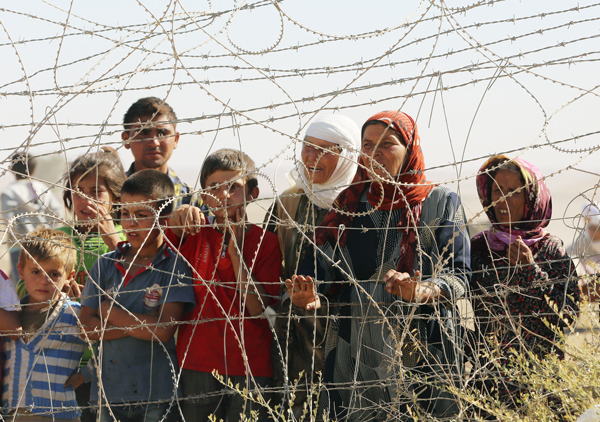
Syrian refugees wait to cross the border into Turkey, September 21, 2014. Photo: AP
In 2014, wars resulting primarily from actions by the rulers of the U.S. empire ravaged much of North Africa and the Middle East including Palestine, Syria, Somalia, Congo, South Sudan, Libya, Iraq, and Afghanistan.
In Syria, as a result of a civil war provoked in large part by the U.S., 12 million people, half the population, have been uprooted from their homes, and three to four million are living in neighboring countries as refugees in the most desperate conditions. The number of deaths in Syria in 2014 as a result of the civil was 76,000, including 3,500 children. The number killed since the civil war began in 2011 is nearly 200,000.
In Afghanistan, after 13-plus years of U.S. invasion and occupation, there were a record number of civilian deaths in 2014—10,000.
Permalink: http://revcom.us/a/368/year-in-review-clyde-en.html
Revolution #368 January 5, 2015
Clyde Young (Wayne Webb), 1949-2014
A Life Lived for the People... and Full Emancipation
January 5, 2015 | Revolution Newspaper | revcom.us
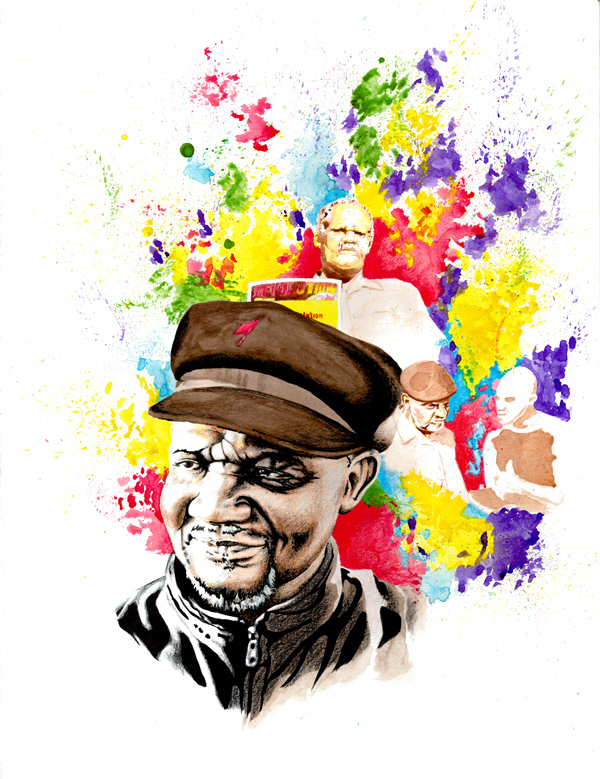
This painting of Clyde Young was sent to Revolution newspaper from Colombia in South America. The artist, upon learning of the loss of comrade Clyde Young, was moved to work tirelessly to create this artwork and contributed it to commemorations of Clyde's life.
In 2014, we lost a wonderful comrade and friend, Clyde Young—also known as Wayne Webb. He was a communist for nearly 40 years...a leader of the people... and a member of the RCP's Central Committee. Clyde Young came up in the mean streets of Midwestern ghettos and first went to prison at age 12—one of the many this system slated for death at an early age, one of the millions and tens of millions whom this system has cast off and cast down. Yet he fought to rise above all that, and came to dedicate his life to the emancipation of all humanity.
Permalink: http://revcom.us/a/367/new-year-protest-reports-en.html
Revolution #368 January 5, 2015
NO NEW YEAR UNDER THIS OLD SYSTEM!
WE CAN'T BREATHE!
January 1, 2015 | Revolution Newspaper | revcom.us
Protest reports
Updated 1/3/2015
On New Year's Eve, as the clock winds down on 2014, the powers that be will hope to be ringing in a new year that carries forward business as usual. That must not be allowed to go down because business as usual in Amerikkka includes wanton police murder of Black people. The refusal of grand juries in Ferguson and Staten Island to indict the cops who murdered Michael Brown and Eric Garner made this clear. So the powerful, beautiful and necessary outpourings that have disrupted this society's normal routine must continue and escalate on New Year's Eve and into the New Year.
Read more
December 29, 2014
Read more
Decenber 21, 2014
Read more
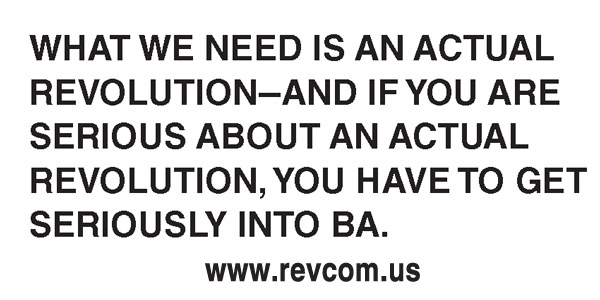
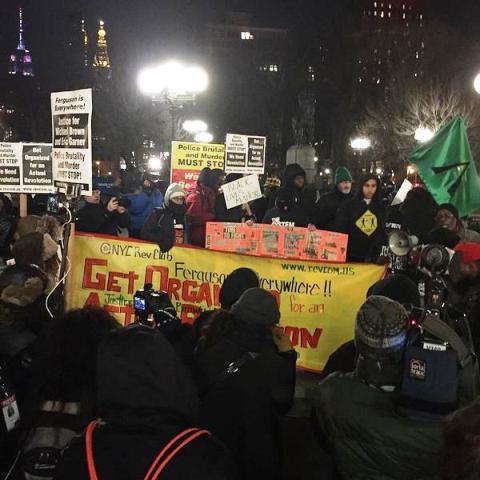
Photo: @I_Cant_Breathe
Midnight: Protesters enter into crowds at Times Square chanting: Indict, convict, send the killer cops to jail - the whole damn system is guilty as hell; I can't breathe; If we don't get it shut it down; How do you spell terrorist? NYPD; and No new year with the same old shit, we need a revolution, get with it.
Read more
Read more

Photo:revcom.us
"We Are All Still Oscar Grant"
Hundreds of people, including many of Oscar Grant's family and friends, attended the 6th Annual Oscar Grant Vigil organized by Oscar's family. The event is held each year outside the Fruitvale BART station where Oscar was murdered by BART police while returning home from celebrating New Year's Eve in San Francisco. At the vigil people spoke, sang, and performed poetry in remembrance of Oscar's life and in support of the struggle to end police brutality, and to say WE ARE ALL STILL OSCAR GRANT.
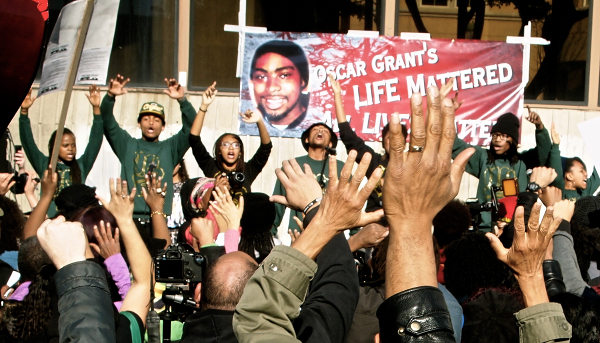
Poetry group Young Gifted and Black performing at the vigil for Oscar Grant. Photo: Special to revcom.us
Read more
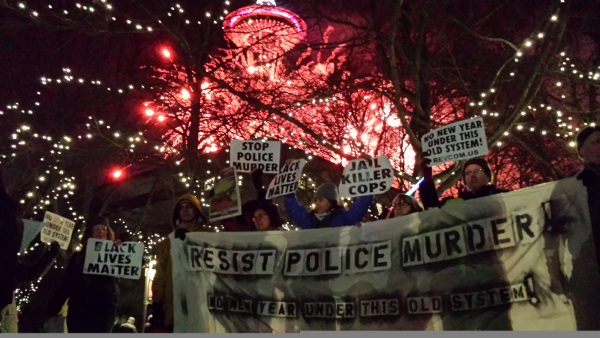
People in Seattle rallied and marched into the middle of the New Year’s celebration at Seattle Center that draws thousands of people to watch fireworks at the Space Needle. We spoke to the crowd calling for people to put their hands in the air to put an end to police murder and say “No New Year Under This Old System.”
Read more
Los Angeles
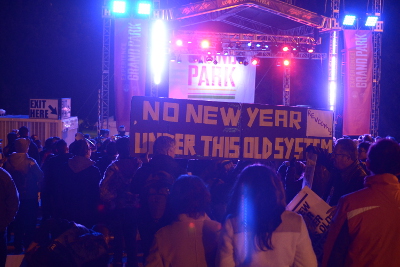
The Revolution Club and Stop Mass Incarceration Network took the call—No New Year Under This Old System; We Can't Breathe—to Grand Park in downtown Los Angeles, where tens of thousands of people came to celebrate New Year's Eve.
Downtown San Francisco
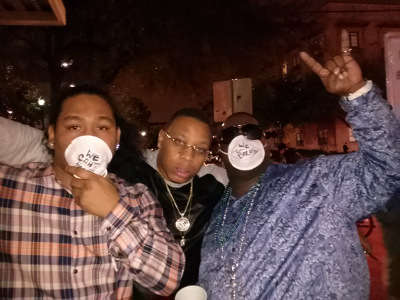
Photo: Special to revcom.us
Read more
About 25 people braved the cold to protest business as usual on New Year’s Eve. At Public Square a huge banner—Rock in the New Year with Resistance to Police Murder! NO NEW YEAR UNDER THIS OLD SYSTEM! WE CAN’T BREATHE!”—grabbed people’s attention. We marched to the official New Year’s Eve event, which featured the rapper, Machine Gun Kelly, whose lyrics demean women.
Read more
Chicago
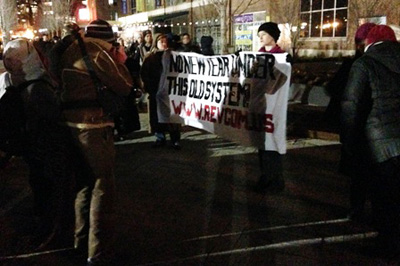
"No new year under this old system" on Chicago's Navy Pier -- 1000s of youth descended on the pier to watch fireworks and many saw the protest.
Photo: revcom.us
Harlem
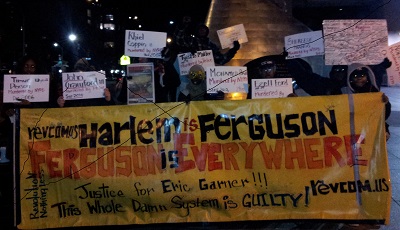
Harlem, New Year's Eve. Photo: revcom.us
Market St., Newark NJ
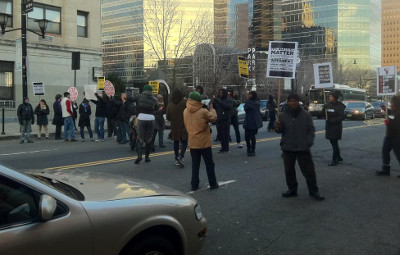
New Year's Eve PM - Market St. in Newark NJ shut down by protest. Photo: Twitter/Art Superheroes @WikileaksTruck
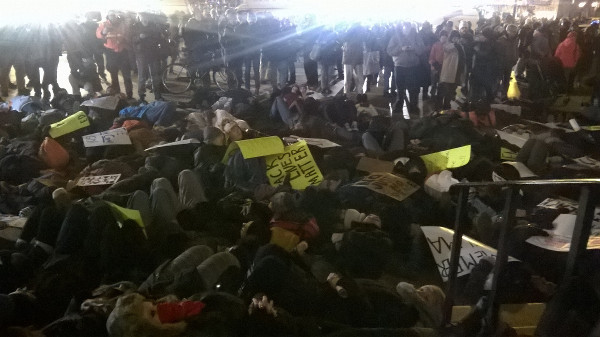
Read more
Pittsburgh
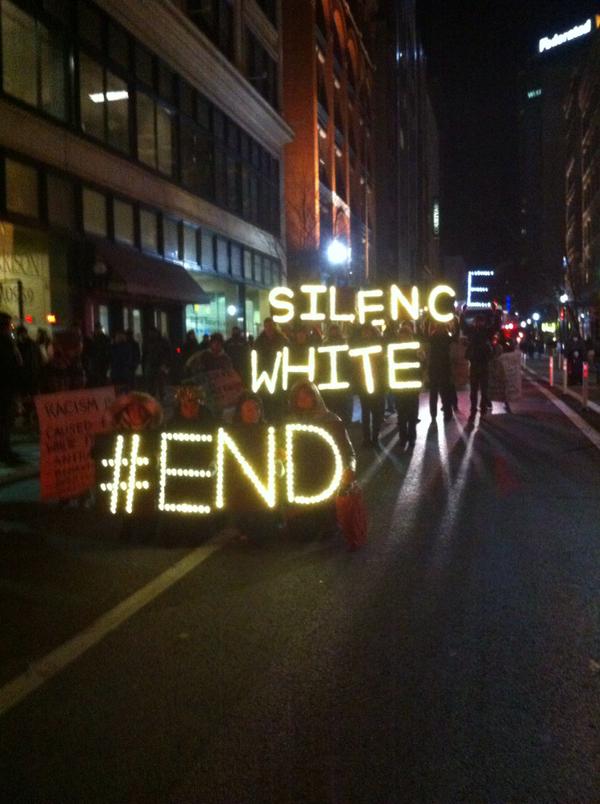
Photo: Twitter/@endwhitesilence
Philadelphia
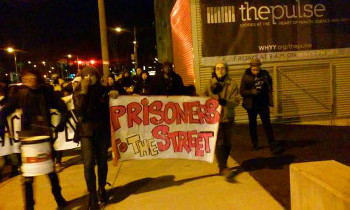
New Year’s Eve #blacklivesmatter protest, Philadelphia, 7th & Arch. Photo: Twitter/@jpegjoshua
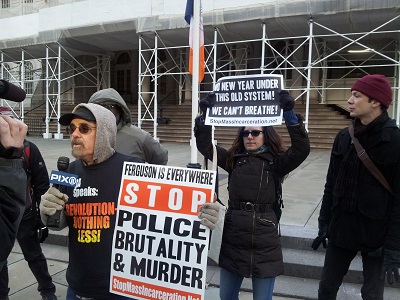
Read more
12/31 Press Conference at Hall of Justice in SF
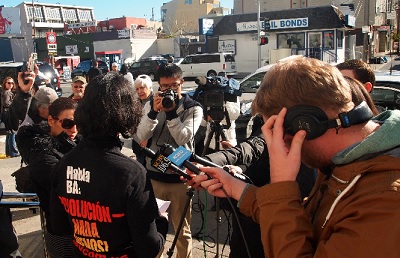
Mainstream and alternative TV, radio and other media showed up for a press conference at the Hall of Justice in San Francisco. Stop Mass Incarceration Network, Code Pink, Mujeres Unidas y Activas, Revolution Club, and a San Francisco high school teacher called for intensifying and spreading resistance in 2015, and New Year's Eve and New Year's Day protests in San Francisco and Oakland.
Permalink: http://revcom.us/a/368/sunsara-taylor-stop-the-war-on-women-en.html
Revolution #368 January 5, 2015
Interview with Sunsara Taylor
Stop the War on Women—Protest in DC and San Francisco in January!
January 3, 2015 | Revolution Newspaper | revcom.us
Sunsara Taylor is a correspondent for revcom.us/Revolution and an initiator of Stop Patriarchy. She helped organize and spoke at the Rock in the New Year With Resistance to Police Murder! NO NEW YEAR UNDER THIS OLD SYSTEM! WE CAN’T BREATHE! march on New Year’s Eve in New York City.
Revolution: You were speaking to the war on women and how it fits into the whole picture of what’s going on, on December 31 during the intense march in NYC. Can you talk about that? How do you see this?
Sunsara Taylor: The last few weeks and months have been spectacular, with outpourings of anger, outrage, and heartbreak against the unrelenting epidemic of police murder. Now, when forces throughout society are saying there should be a moratorium on protest, it was important that people stepped out, that Carl Dix and the Stop Mass Incarceration Network called for these actions on New Year’s Eve.
One of the strengths of this, beyond calling on the upsurge against police murder to go broader and deeper, was to bring in these other issues and challenge people to go from fighters on one front to fighters on all fronts against oppression. Women are half of humanity. As BA—Bob Avakian—has put it: “You cannot break all the chains, except one. You cannot say you want to be free of exploitation and oppression, except you want to keep the oppression of women by men. You can’t say you want to liberate humanity yet keep one half of the people enslaved to the other half.” (BAsics 3:22)
We’re living in a time when there’s an unrelenting war on women, and other forms of oppression by this capitalist-imperialist system.
Revolution: I think a lot of people see a lot of fucked-up stuff happening to women but can you break down what you mean by a war on women?
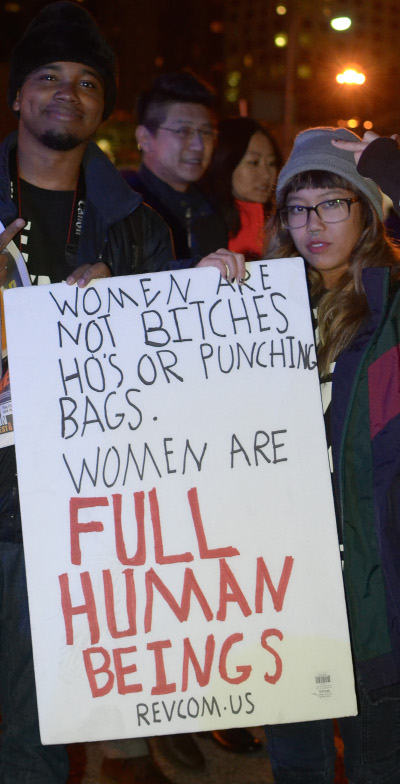
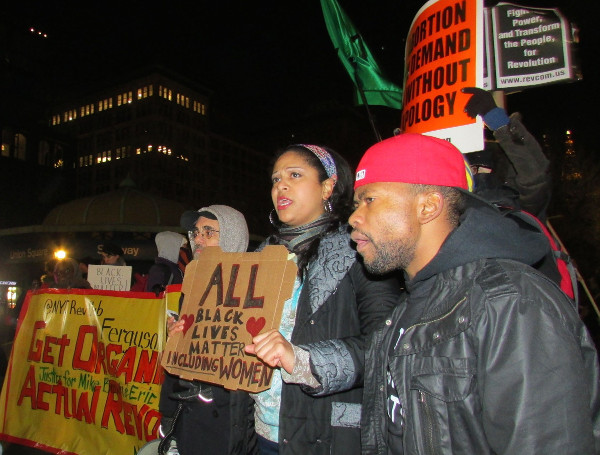
Union Square, New York City, New Year's Eve.
Photos: revcom.us
Sunsara Taylor: There is an all-out unrelenting war on women. There is an epidemic of rape. Violence against women. Three or four women are killed every day by their “partners” in this society. There is increasingly violent and degrading porn. There is bigotry, hatred, and violence against those whose love does not conform to dominant heterosexist norms or roles this society enforces for “male” and “female” behavior. One of the key fronts of this war is the Christian fascist assault on women’s right to abortion.
It was very moving to me to see people respond enthusiastically when I spoke about this at the protest, as well as when I and others spoke about the war on immigrants, the torture, the drones, and global climate change. These things are all rooted in the system of capitalism-imperialism that rules over us and these are all reasons we need an actual revolution.
This war on women also includes the state-backed closure of dozens and dozens of abortion clinics, the passage of hundreds of anti-abortion laws, and the threat this poses to women everywhere. If you want to fight to end oppression, you have to take this on. There is no “us” and “them” within the fight against oppression. The us is those of us fighting the system, and the them is the system. I called on people to join with me and others, and to take the spirit of defiance that began in Ferguson, and which has spread across the country, and go down to DC on January 22 [the anniversary of the Supreme Court's 1973 Roe v. Wade decision legalizing abortion nationwide] and San Francisco on January 24 to confront the women haters, the anti-abortion Christian fascists at their huge “march for life,” which is really a march for female enslavement and forced motherhood.
The unity forged in the streets needs to go broader and further and is precious to those who want a different world. And 2015 has to be the year we stand up against all of this.
Revolution: Can you talk more about the nature of this unity forged in the streets and the way this took shape on New Year’s Eve?
Sunsara Taylor: Stop Patriarchy had been mobilizing people to come out on New Year’s Eve both to join with the overall message and specifically to bring signs around women’s liberation. That message was really well received, starting at the planning meetings. It was very moving to hear people who had come into this movement mainly around police brutality and mass incarceration—around Black lives matter—responding very deeply to the need to support LGBT rights and abortion rights and people around the world struggling for liberation. It wasn’t that these were formal demands of the organizers of the protest, but this was very widely supported. So it began there. And it continued in the street on December 31 with the bright, beautiful signs with the words “Abortion On Demand and Without Apology,” and another with “Women Are Not Bitches, Ho’s, or Punching Bags... Women Are Full Human Beings.”
People wanted to help hold the signs. People put on stickers—it was a beautiful sight, people with “Get Organized for an Actual Revolution” signs, with “Police Brutality Must Stop,” and others, with “Abortion On Demand and Without Apology” stickers right on those signs. A beautiful mix.
A lot of people took pictures of these signs around women. People were happy they were there. And when I spoke, the reaction was very vehement, and not just among women, the body language—in the cold—people happy to have this included. Including a woman who got up with an “ALL Black Lives Matter Including Women” sign, who talked about women killed by police, who often don’t get as much attention, and the struggle of LGBT and trans women, and violence they confront by law enforcement—all that has to be part of the struggle. There was a very young Black woman from North Carolina, someone who came to New York to get out of the suffocating scene she had been in. When she got here, she heard about the protest, said wow! and found her way down to this protest in a new city. She got on the mic and talked about how much self-hatred this society fosters against people for being Black, for being women, for being lesbians. She really touched me and others. She was there to support the fight against police brutality, but it was clear that all of what was on her mind was welcome in this crowd, all these forms of oppression.
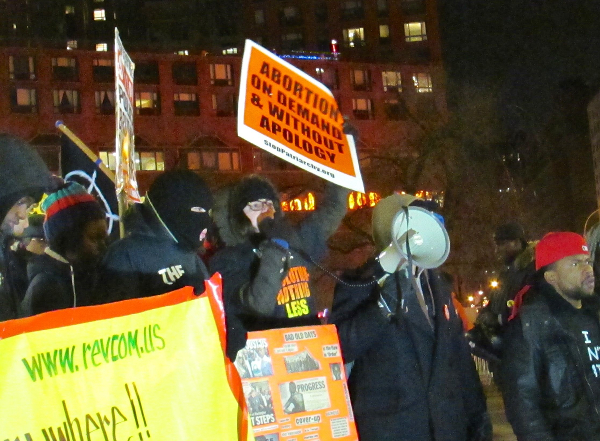
Sunsara Taylor speaks at Union Square rally, New York City, New Year's Eve. Photo: revcom.us
Several people, including some parents of children killed by police, said they want to come to the abortion rights protest in DC. That was the spirit in the crowd. To some people without a doubt, hearing about women’s liberation, abortion rights, LGBT was not expected—but it was a good thing for them to hear. And overall this was really embraced.
This also recalls to my mind the deep response from the audience at the Dialogue between Cornel West and Bob Avakian in November, “Revolution and Religion: The Fight for Emancipation and the Role of Religion,” the thunderous applause and cheering that erupted when BA spoke directly to the horrors faced by women and the need to break all the chains, in the context of painting a vision of a world without any form of oppression. There was enthusiasm for pulling all this together, and a real depth to the response to the vision of women really being treated as full human beings. This is something, both the response at New Year’s and especially the response to BA on this during the Dialogue, we should learn from and right now we should be taking this question—of women’s liberation and the fight for abortion rights—and the plans for the Roe v. Wade demos coming up very boldly out to every section of society, including those on the very bottom, those who catch the hardest hell under this system. This is a critical part of fighting the power, and transforming the people, for revolution.
Revolution: Let’s get into the plans for protests in January against the war on women and to defend abortion rights in particular.
Sunsara Taylor: Just so people understand the situation and facts: There’s been an unrelenting attack on abortion. Dozens and dozens of clinics have been closed in recent years. Hundreds of new laws have passed, mandating longer waiting periods before a woman can get an abortion. All this is making it much more difficult to access abortion, especially for women with children who have to travel great distances. There are clinic closures. And this is all getting codified in law and so it is very difficult to reverse.
Every year—around the anniversary of the January 22, 1973 Roe v. Wade decision when the Supreme Court legalized abortion nationwide—at this time the movement for forced motherhood, the so-called “pro-life” movement, mobilizes huge marches in San Francisco and DC to celebrate the movement for forced motherhood and to spread their Dark Ages agenda, their Christian fascist ideology, and to pump people up for even stronger attacks on women’s rights. This is a very dangerous thing. It is women hating, backed by the state, at center stage of society, unveiled. It is imperative this be frontally opposed.
Stop Patriarchy is calling on people to confront the women haters. To bring out the truth: Women are not incubators! Fetuses are not babies! Abortion is not murder! And to build a movement to defeat the war on women.
And those of us who understand this in this way—that all this women hating is not a product of human nature but a product of the capitalist-imperialist system that inherited women’s oppression but has woven it into its functioning, that needs that—those of us who understand the need to make revolution to change this as well as all the other horrors—genocide going on against Black people, unjust wars the U.S. carries out around the world, the way the capitalist-imperialist drive for profit is taking us to such extremes in environmental devastation and threatening life on planet as we know it—those of us who see this all rooted in this system, we are taking up this mobilization as part of a movement for an actual revolution. Waking people up, changing people, and yes taking people from fighters on one front to fighters on all fronts.
We want to launch 2015 as a year of unprecedented, massive struggle against all oppression against our people here and around the world.
Revolution: Where do people go to learn more and how do they get involved in the actions planned for January?
Sunsara Taylor: Everyone should check the stoppatriarchy.org site and revcom.us. Prepare now to join us at noon on January 22 in front of the Supreme Court in DC. And on January 24 in San Francisco; come from all up and down the West Coast and converge in San Francisco.
On January 17, we’re holding an abortion rights speakout in New York City that will be webcast live. Revolution Books stores, churches, and students should host viewing parties. Tune in live to this speakout—you will hear about the real stories of women about their own abortions, how this has impacted them. And donate financially at stoppatriarchy.org.
Come! On both coasts—to counter-protest on the anniversary of Roe v. Wade.
Women are not incubators! Fetuses are not babies! Abortion is not murder! Join us to build the strategy to defeat the whole war on women.
Permalink: http://revcom.us/a/367/sunsara-taylor-and-carl-dix-on-confronting-the-anti-abortion-woman-haters-en.html
Revolution #368 January 5, 2015
Sunsara Taylor & Carl Dix on Confronting the Anti Abortion Woman Haters January 22 & 24, 2015
Jasnuary 2, 2015 | Revolution Newspaper | revcom.us
Permalink: http://revcom.us/a/366/conclusion-of-the-opening-presentation-by-bob-avakian-to-the-november-15-dialogue-with-cornel-west-at-riverside-church-in-new-york-city-en.html
Revolution #368 January 5, 2015
Conclusion of the Opening Presentation by Bob Avakian at the November 15 Dialogue with Cornel West at Riverside Church in New York City
December 22, 2014 | Revolution Newspaper | revcom.us
The following is what Bob Avakian had prepared as the Conclusion of his Opening Presentation at the Dialogue with Cornel West on November 15, 2014, but it includes parts beyond what was actually presented by BA at the Dialogue itself. Watch the video of the Dialogue at www.revcom.us.
What gives meaning to life, what is truly a life with a purpose? Living in this country, in this cut-throat system that plunders the whole world, you are encouraged, and constantly pulled, to be absorbed in "self." The "selfie" is indeed a fitting icon of this culture. (Often what you hear sounds like a singer warming up: me, me, me...!) For the more privileged, there is all too often the sense of being entitled to all that is provided by nature and produced by the world's people, while remaining ignorant of, or deliberately ignoring, the terrible reality of life for the great majority of humanity, and for great numbers of people within this country. You know how it goes: "We're parasitic Amuricans—we don't have time to learn about the world, we're too busy gorging ourselves on it!" (Hashtag: "Parasitic Amuricans") Or, if you're in a more desperate situation, you are driven to hustle, scramble, and scuffle to get what you can—while things work to keep you from understanding why things are the way they are, and how they could be radically different. This is the way it is under this system. This is an empty, cold, cruel way of life, lacking in deeper meaning and higher purpose.
Now, once again we see people beginning to raise their heads, to break with the normal routine, to question and resist—to stand up and rise up. The question is, where will this go—where will it be led: back within the deadly dead-end trap, the killing confines, of this system, or building toward the real solution, a revolution to get rid of this system and bring something much better into being? Human life may be short, but it can be full of meaning—the meaning we give to it. As I have put it before: "If you have had a chance to see the world as it really is, there are profoundly different roads you can take with your life. You can just get into the dog-eat-dog, and most likely get swallowed up by that while trying to get ahead in it. You can put your snout into the trough and try to scarf up as much as you can, while scrambling desperately to get more than others. Or you can try to do something that would change the whole direction of society and the whole way the world is. When you put those things alongside each other, which one has any meaning, which one really contributes to anything worthwhile? Your life is going to be about something—or it's going to be about nothing. And there is nothing greater your life can be about than contributing whatever you can to the revolutionary transformation of society and the world, to put an end to all systems and relations of oppression and exploitation and all the unnecessary suffering and destruction that goes along with them. I have learned that more and more deeply through all the twists and turns and even the great setbacks, as well as the great achievements, of the communist revolution so far, in what are really still its early stages historically."
But let me say this: I am a confirmed atheist, and am firmly convinced that what we need to bring a much better world into being, is the method and the morals of communism, not religion; yet Cornel is much closer to my heart than many atheists. WHY? Because too many atheists use their atheism to sit smugly, satisfied with the world as it is, or even use it to justify the world as it is.
With Cornel there is none of that world-weary cynicism and small-minded snarkiness that serve as a convenient cover for remaining complacent, and complicit, with injustice and the continual horrors inflicted on the masses of humanity. Cornel is a voracious intellectual with a deep appreciation for the life of the mind, but who also understands that a role and responsibility of an intellectual is to stand with the wretched of the earth and take a stand in the fight against oppression. And I would much rather walk with Cornel than with a smug atheist.
Now don’t get me wrong, there are some very good atheists—communists, humanists and others, but all too many who are justifying going along with the way things are.
The movement I envision, and am working for, is one where people like Cornel and myself can walk together on the road of revolution and emancipation—uniting in the struggle to bring about a world where there will no longer be the wretched of the earth but human beings giving ever greater expression to their humanity, in a myriad of diverse ways—and, yes, we will argue, vigorously, about how to bring this into being, even as we proceed arm-in-arm together.
As I emphasized in Away With All Gods!: "In terms of the basis of unity in the political struggle, the dividing line should never be whether or not people believe in god and are religious, but whether they are willing to unite, and can be won to unite, in ways that are objectively in the interests of the masses of people. To the degree that they do so, it is necessary to build unity with them, and to struggle with them to do so more fully and consistently, even while struggle is also carried out with them, in the ideological realm, over the question of which worldview actually corresponds to reality and will lead to emancipation." In the broadest sense, the movement we need to radically change the world is one that embraces all those who are determined to fight injustice; is marked by unity, and struggle; largeness of mind and generosity of spirit. In this light, let me end with a call which I have made before and which seems very fitting on this occasion.
"AN INVITATION":
Let's go on a crucial journey together—full of unity against oppression and lively struggle about the source of the problem and the solution. Pursue your own convictions—that the outrages that move you are intolerable—to their logical conclusion, and be determined not to stop until those outrages have been eliminated. And if this, as well as learning about other outrages, and ideas about how this all fits together and flows from a common source—and how it could all be ended, and something much better brought into being—leads in the direction of seeing not only the need for bold and determined resistance, but also the need for revolution and ultimately communism, then don't turn away from that because it moves you beyond your comfort zone, challenges what had been your cherished beliefs, or because of prejudices and slanders. Instead, actively seek to learn more about this revolution and its goal of communism and to determine whether it is in fact the necessary, and possible, solution. And then act accordingly.
Permalink: http://revcom.us/a/365/experience-dig-into-spread-and-support-this-dialogue-getting-out-in-the-world-en.html
Revolution #368 January 5, 2015
The Time Is Now!
Experience, dig into, spread, and support this Dialogue getting out in the world
December 15, 2014 | Revolution Newspaper | revcom.us
This is the text of a talk given at the December 14 BA Everywhere Dinner Celebrations in cities across the country. The talk followed the showing of segments of the video of the November 15 Dialogue between Cornel West and Bob Avakian, “Revolution and Religion: The Fight for Emancipation and the Role of Religion.”
The preacher put the key under John Coltrane’s door, giving Trane the backing to develop. Not too many years later, Coltrane blew A Love Supreme out of his tenor sax, an inspiring gift to the world giving expression to the pain, the aspirations, and the beauty in the hearts of Black America and all who yearned for something more than what was, in the soulful and tumultuous 1960s. Cornel West made the point that together we can bring forth the new.
What humanity needs, what Cornel West and Bob Avakian came together to dialogue about, and what we are here for tonight, is to support and be a part of the great struggle to emancipate humanity. And as Bob Avakian brought out in the story at the end of the Dialogue, recalling the words of Mao Zedong spoken to W.E.B. Du Bois, is that while mistakes have been made on the path to liberation, the one mistake we have not made, and will not make, is the mistake of giving up. Indeed, a major point that BA made in his presentation and in the Q&A is that for humanity to be free, we must win, and that there is the framework and the leadership to do so, and he invited people to be a part of this great endeavor.
At a moment like this, aroused first by the actions of the determined ones in Ferguson, and now as tens of thousands are out in the streets; when people from every section of society are defiantly speaking out and acting in new ways... In a time like this, you can see in a beginning way what has been put forward in the RCP’s statement, “On the Strategy for Revolution”: that all this system does to the people, all the contradictions in the workings of the capitalist-imperialist system we live under, periodically erupts, jolting its normal workings; so that which people ordinarily tolerate, the feelings and anger so long held inside, and what all too many from better-off strata have closed their eyes to, bursts into the open—with people standing up, opening their eyes, saying Enough! And acting so that the whole world can see.
These are times when the pompous ruling tyrants of America who carry out inhuman torture and murder in the ’hoods and prisons of this country and who do the same around the world, all while proclaiming that this is the greatest country in the world, stand exposed in the eyes of millions for the murderous brutality that is the way of their system... A time when their inability to provide anything remotely close to a just world in which people could live like human beings stands nakedly exposed and their legitimacy begins to be called into question. This is a moment when people begin to sense their own potential.
No President Obama... the Torture Report is who and what America is... this was not an aberration—from the genocide of Native Americans to enshrining slavery down to today you can not find a year when the U.S. is not committing and justifying unspeakable crimes. At a moment like we are living through right now, the potential for far deeper change, for building the understanding and the organization to bring about a radically better world through revolution seems more possible, more real, to more people.
We break bread tonight, we celebrate, and we plan so that in 2015 what has begun over the summer and fall of this year continues—with people’s understanding, determination, and organized strength growing in leaps.
We just watched a small taste of the historic Dialogue that took place on November 15, 2014 between the revolutionary Christian, Cornel West, and the revolutionary communist leader, Bob Avakian. The world has not seen an event like this... 1,900 people at Riverside Church in NYC... from the projects of Harlem and Chicago; front-line fighters from Ferguson; parents whose children’s lives have been stolen by murdering police... high school and college students... and people from all walks of life, including world-renowned musicians, professors, actors, and filmmakers. Think about how unique this mix of people is, and the potential it represents. And for what? About what? For a rare opportunity to hear Bob Avakian in dialogue with Cornel West digging into REVOLUTION and Religion... The FIGHT for EMANCIPATION and the Role of Religion. At this moment. At this place. With these people.
BA and Cornel West electrified the room with a fire of intolerance for oppression, a deep palpable love of the people, and a passionate belief in people’s potential to change themselves and the world. No quarter was given to accept, acquiesce, or be complicit with the crimes and outrages of this system. BA and Cornel West struggled with the audience for a morality and a moral courage that these times demand. They fought for people to see the need for radical, revolutionary change—each of them coming from different philosophical frameworks. There was, as Cornel West forecast, transgression and convergence. They modeled and challenged the audience to think and to act on their convictions and to do so with courage.
This comes alive in an up-close way on the video of the simulcast that is available on www.revcom.us. You can feel Cornel West’s and Bob Avakian’s chemistry with each other and the audience—the rapport, respect and love, even when they disagree. All of this will be even more evident when a high-quality film is made of the event with the financial support that we are going to go forward from this celebration today to raise.
Right now, when hundreds of thousands of people do not want to go back, when eyes and hearts are opening, when people are finding their voice and their courage, when so much could be possible, when people are posing big questions like what will it take to end the oppression of Black people and the murder and incarceration of our youth... with all this in the air, people need to experience, dig into, spread, and support this Dialogue getting out in the world. It can have a big transformative impact on how people understand why all the horrors of the world today keep happening, and how they could be radically transformed and a new society, a new world, forged through revolution.
Bob Avakian’s opening presentation was a full-out, no-holds-barred, passionate presentation of why we need a revolution to overcome ALL forms of oppression and exploitation. Addressing the role of religion in the fight for emancipation, he broke down why we need to understand reality—that is, the world we live in—as it actually is. With great humor he made a scientific approach to reality understandable; and he brought forward a profound communist morality—of how the world ought to and could be through a revolution where all the divisions that this system sows between people could be overcome.
Think about the strategic potential in the audience’s powerful response to BA’s “What If’s” that we saw tonight in the excerpt from his talk. BA reframed all the horrors of the world as it torments and confines life today as questions of what could be, providing people with a materialist morality and a vision of what could be, posing: “What if the world doesn’t have to be this way?”
At this moment of upsurge, there is a tremendous basis and an urgent necessity to reach hundreds of thousands, if not millions, to see this Dialogue. For people here to be finding out what people think about it, and unleashing a social movement around the revolutionary content and the questions that are concentrated in the Dialogue.
The invitation to today’s dinner said: “Come together to celebrate the victories and achievements of the past year, even as we remember the outrages and horrors that people faced.”
When Eric Garner said to the pigs who were harassing him on July 17: “THIS STOPS TODAY,” a chain of events seems to have started, beginning with his murder, captured for the world to see on video. Then three weeks later, on August 9, Michael Brown was shot in a town few had heard of, but by the actions of the masses begun that night, Ferguson became a rallying cry the world over. Yet, these events concentrated a whole history that continues to be lived today.
These events are the legacy of what Bob Avakian has called the “simple and basic truth” that “There would be no United States as we now know it today without slavery,” a legacy that has continued, and morphed into new forms of white supremacy, still central to this society.
Six years into Obama and people’s hope for change has run up against the reality that he is the commander in chief of the whole system, and a war criminal to boot. And, it’s not just the oppression of Black people. Just this past year, tens of thousands of immigrant children were imprisoned on the border and many deported; a woman’s right to abortion was stripped away in state after state; and the environmental crisis grew even more dire.
Stepping into that situation this summer, the Abortion Rights Freedom Ride put forward a program of determined struggle for the right of women to control their own destinies. September saw the biggest demonstration against global warming in U.S. history. This too was a summer when the Call for a Month of Resistance to Mass Incarceration issued by Cornel West and Carl Dix was spreading, culminating in defiant demonstrations on October 22.
The current upsurge, which seems to have come out of nowhere, did not come from nothing. All of this, from the nature of the system and its workings, the responses and anger of people, and the conscious work of revolutionaries and others contribute to the mix. What is even more important at moments and junctures like this is raising people’s sights to a radically different world, grappling with what is the underlying problem, and what is the solution to all the madness and horrors that people are confronting, resisting and rising up against, in the thousands and in the millions.
This speaks to the immediate and long-term import of people coming to know about Bob Avakian and the work he has done. This is the purpose and mission of the BA Everywhere campaign. It is a mass, multifaceted fundraising campaign to make BA and the work he has done known in every corner of the country.
From the excerpts we watched earlier from the November 15 Dialogue, you got a living sense of BA’s love and feeling for the masses of people, his sense of outrage and hatred for all the ways in which people suffer needlessly, and his fire for revolution. This is the product of decades of work, sacrifice, and risk to develop the scientific method, the strategy, and the vision that humanity needs to get free. Bob Avakian has developed a new synthesis of communism which is a scientific method for knowing and changing the world. Communism is method, it is a revolutionary political movement, and it is an actual goal of a society that really could be... free of all forms of oppression and exploitation. And BA’s work has put this on a more scientific foundation, made it more viable and visionary.
With a combination of far-sighted vision and great practicality, BA leads the RCP, USA so that it is out in the world, standing with the people, FIGHTING THE POWER, AND TRANSFORMING THE PEOPLE, FOR REVOLUTION. Bringing to people the understanding they need through Revolution newspaper and www.revcom.us. Working concretely today to GET ORGANIZED FOR AN ACTUAL REVOLUTION.
We have just made an enormous step in making BA known on a whole other level through the November 15 Dialogue. But, we have just begun. The video of the simulcast has been watched by thousands online. Tens and hundreds of thousands need to see it. Now, in the thick of the upsurge, and in ongoing way.
For the next two months, getting this Dialogue seen, watched, and discussed will be the central focus of the BA Everywhere campaign. Tens of thousands of dollars need to be raised to make and promote a high-quality film of the event.
Today we are putting forward some basic elements of a plan that can be enriched and developed by growing BA Everywhere Committees around the country, by Revolution Clubs where they exist, by Revolution Books stores, and by everyone who recognizes the difference it could make if people saw this Dialogue, engaged the content of it, and involved others in supporting and making it a big deal. Here we go:
# 1) A reader wrote revcom.us: “we have to bring people back to, and bring them forward from, this Dialogue between Bob Avakian and Cornel West,” watching it together, asking them what they think of it, what their questions are, and digging into it. We are in a moment when people are out all day and often into the night fighting the power. What a great way to raise and deepen understanding of why these outrages keep happening and what is to be done today in preparation for tomorrow than for people to watch and dig into “Revolution and Religion: The Fight for Emancipation and the Role of Religion, A Dialogue between Cornel West and Bob Avakian.”
# 2) What better time to do this than over the holidays? Watch it with everyone you can. House parties and showings. Send the link out to everyone. Distribute 100,000 palm cards starting now and on through January. Raise funds. Use the new donation cards to raise funds from relatives, friends, and people you meet.
# 3) As soon as school starts after the new year, set up showings in classes, in dorms, in high school and college clubs. Palm cards and posters for the Dialogue should be everywhere on campuses.
# 4) Reach out to people who could donate big money to make a high-quality film of the event. The event was professionally filmed and great footage exists, different from what is in the simulcast. Show the simulcast so people get a sense of its power and potential.
# 5) The movement for BA Everywhere needs to grow, and spreading the Dialogue holds the potential for many people to take it up. BA Everywhere Committees should broaden and involve all of those who see, or who can be won to see, that it would make a very big difference if what is represented by Bob Avakian and the new synthesis were to be a point of reference, the subject of discussion and debate throughout society—even as they are themselves coming to know more about it, and are working out their thinking. Alive with discussions of the Dialogue and the responses to it, the BA Everywhere Committees will reach out to all sections of the people. In the projects and the neighborhoods... involving people experienced in social media, film production and/or the graphic arts... lawyers, doctors, social workers and teachers... prominent and wealthy people financially supporting and using their public platform to make this known.
***
In conclusion, we have spoken of bringing people back to this Dialogue and we have looked briefly back at 2014 and what has changed and what is changing. All of this is for the purpose of moving forward—to enable tens and hundreds of thousands and even millions to come to see and feel that, indeed, humanity does not have to live like this. BA, Bob Avakian, and the Party he leads, and this Dialogue are about getting free. People need to know that there is a viable vision, plan, and leadership to bring forward a radically different and far better world through revolution. Today, more than ever they have ears to hear this message. Let’s bring it.
Permalink: http://revcom.us/a/363/transgression-and-convergence-infectious-chemistry-and-serious-urgency-reflections-on-the-Dialogue-en.html
Revolution #368 January 5, 2015
Transgression and Convergence, Infectious Chemistry and Serious Urgency:
Reflections on REVOLUTION AND RELIGION: The Fight For Emancipation and the Role of Religion—A Dialogue Between Cornel West and Bob Avakian
by Andy Zee | November 30, 2014 | Revolution Newspaper | revcom.us
3:00 p.m., Saturday November 15, brilliant sunshine barely warms the coldest day of Autumn 2014. A double line of people stretches around the block in front of Riverside Church in New York City. The main floor of Riverside’s enormous chapel fills and two balconies are opened up to seat the capacity crowd. Sunlight streams through the stained glass windows and the place crackles with anticipation. An announcement is made that we are waiting for a bus from Chicago that includes people from Ferguson, Missouri who have been on the front lines in the struggle for justice for Michael Brown.
Cornel West and Bob Avakian are backstage making their last minute plans for their dialogue, when all of a sudden the air is broken with loud rhythmic voices coming from the chapel. Cornel and Bob ask: What’s happening? The whole place is on its feet chanting “Hands Up! Don’t Shoot!” as Ferguson enters the room.
The spirit of revolution and resistance and of serious purpose is in the house and in the air—looking forward to a deep engagement with the life-and-death questions about humanity’s future. People came excited and curious for the rare chance to see and hear Bob Avakian live and in person and in dialogue with Cornel West, at a moment when people around the country were tense awaiting the Ferguson verdict and were coming alive after a summer of struggle with a new determination put a stop to the epidemic of police murder of Black and Latino youth. In the weeks leading up to the event, the Dialogue organizers had stressed that believers and non-believers were welcome—that the dialogue was not just about one’s personal beliefs but about a question—the fight for emancipation and the role of religion—that matters deeply to billions of people at this moment in history.
1,600 people are ready as REVOLUTION AND RELIGION: The Fight for Emancipation and the Role of Religion—A Dialogue Between Cornel West and Bob Avakian is about to begin. A full-page ad for the dialogue appeared in the New York Times two days before, fueling the understanding that this was an event of great import. Before the hour is out, 1,900 people will fill almost every seat in Riverside. The turnout evidenced a broad hunger to hear these two people speak on this topic.
It was a rare electrifying mix of people—scores of people from the projects around New York and from Chicago and cities across the country. Front-line fighters from Ferguson, people of all nationalities, ages and genders. Public high school students, university students from Columbia, Rutgers, and CUNY intermixed with distinguished professors and high school teachers. Prominent musicians, actors, writers, filmmakers, religious leaders and activists from different churches and denominations fill and are abuzz in the pews. People were watching on Livestream on the West Coast and in other countries.
The program was on. After brief introduction, Cornel West and Bob Avakian each spoke with passion and depth to the need to stand up to the outrageous suffering of the billions of this planet. Giving voice to what has been all too absent from political discourse for decades—they both unsparingly criticized excuses to accept, to become indifferent to, to acquiesce and/or be complicit with the horrors that this system rains down on the people and the planet. Together they struggled with the audience for a morality and a moral courage that these times demand. And, they fought for people to see the need for radical, revolutionary change—each in their own way and coming from different philosophical frameworks. They modeled and challenged the audience to think and to act on their convictions and to do so with courage.
Before the dialogue Cornel West recorded a PSA that promised that there would be “transgression and convergence.” Indeed. Their differences with each other and their struggle with the audience were palpably undergirded with a respect and love that arises from the potential for people to rise up to change themselves and the world. One woman from the suburbs commented that she hadn’t heard anything like this for decades—it was so rare and inspiring to listen to and be in the presence of such impassioned, knowledgeable speakers who weren’t attempting to trade platitudes or promises for votes or other favor, but who have and continue to put themselves on the line for their convictions.

This was a dialogue—two substantive presentations followed by a profound discussion between Cornel West and Bob Avakian bouncing off of incredibly thought-provoking written questions from the audience. It repays repeated listening and watching the whole thing, which you can do on line at www.revcom.us. The poet and writer Alice Walker posted the video on her website, writing: “Thank you, brothers West and Avakian, for this ray of light.”
In this report we are but trying to convey the experience and import of the Dialogue. We will touch on just a few of the themes and the content that Bob Avakian and Cornel West discussed—hopefully enough so that readers go to the video and dig into it themselves and together with others.
Bob Avakian (BA) spoke first with a sweeping and in-depth talk that began with a dedication to Clyde Young, a friend and a member of the RCP,USA’s Central Committee who recently died. Clyde Young, also known as Wayne Webb, grew up hard, as one of those who the system treats as the “worst of the worst.” In prison for most of his early life, Clyde became a revolutionary and dedicated his life to the emancipation of all of humanity. He was courageous; a deep thinker, and friend to masses of people all over the country. In his visceral and personal dedication to Clyde Young, BA brought alive how those who are despised and demonized by this system can come to understand the causes of this and the solution through revolution; and in so doing lead lives and lead the people to transform themselves and the world.
BA challenged people’s thinking, at times taking them out of their comfort zones. Many were inspired and exhilarated to be confronted with a moral and methodological framework that unsparingly took on all the political and ideological assumptions that this society rests on. How rare for thousands to experience Bob Avakian give a full-out presentation of revolution to overcome and rid the world of all forms of exploitation and oppression. This was not talk that invoked the word revolution to offer some changes at the edges of the brutality of the current system. BA made a profoundly radical—which means getting to the root—call for real revolution and the morality and the methodology that humanity needs to emancipate itself.
Most people had never heard such a talk before. People with experience from the 1960s, or who had studied the period, reached back for comparisons. But this was different and new, as Avakian began with, and returned to, a discussion of morality—a morality rooted in a scientific method of understanding the world as it actually is and how it could be transformed through revolution. He broke down the scientific method through example and humor so that all could understand. From this perspective—a materialist understanding that another world is possible through revolution, BA posed and spoke to big questions such as: “Can we do without god?” “Can we be good without god?” “And, if there is no god, what can our guide be in struggle for a more just world?”
BA began his discussion of religion by sharply exposing the horrific social relations that run through the New and Old Testaments—the patriarchy, the vengeance, the endorsement of slavery and brutality. He then posed how all but the most fanatic religious fundamentalists take a pick-and-choose, “salad bar” approach to scripture—discarding what is abhorrent today and resting their faith and their actions on those portions of the Bible they believe to be morally good. He said that if this is what you are doing, say so, posing this as a contradiction to grapple with. At the same time, he embraced those whose religious convictions lead them to stand with the oppressed in their struggle to end oppression, and encouraged them to continue to do so, putting forth the understanding of why it is that ultimately relying on “faith” will straitjacket the ability of humanity to liberate itself. Later, in his presentation and in the dialogue between them, Cornel West would sharply challenge this perspective with the experiential impetus and foundation that faith plays in his ability—and in the ability of Black people in America—to live, love and to struggle. Yet Cornel too, from this perspective, stressed the import and basis for people to stand together against oppression and repression and that this must guide what we do, and who we stand with.
In a passage that stirred the audience, Bob Avakian posed a compelling vision of the possibility of a radically different and better world that made the horrors of this world stand out as so outrageously unnecessary and out of sync with what is possible. He posed: “What if the world doesn’t have to be this way? What if we could live in a world where never again will a parent have to fear for the life of their child just because of the color of their skin?” He went on to pose horror after horror up against what could be. The two “what if's” that brought down the house with cries of recognition were: “What if there were no such things as immigrants, what if we lived in a world community of human beings without borders and tanks and guns and planes to enforce that.” And, “What if women could walk down the street and look every man they encounter straight in the eye and fear nothing?”
Avakian gave no quarter to the reality of what the U.S. is and does. He exposed the lies and cohering myths that blind people to this—including the tremendous crimes against humanity committed by the Democrats—and he challenged the audience to confront just what it is they endorse when voting for those who are, in fact, war criminals. At the same time, BA spoke to what was the imminent grand jury verdict in Ferguson and the profound need to act. This section of the speech merits revisiting right now.
~~~~~~~~~~
After Avakian’s speech Cornel West gave an impassioned, strong exposition of the revolutionary Christian approach to changing the world. He began by saying, "My brother Bob Avakian can sustain the revolutionary fire for a long time"—speaking to the scope, length, and revolutionary fire of BA’s talk, and locating this in BA never giving up over decades, never selling his soul for some “pottage.”
Cornel began and rooted his talk in the need to be faithful to the oppressed. His talk was framed by four questions posed by W. E. B. Du Bois in 1957: “How does integrity face oppression? What does honesty do in the face of deception? What does decency do in the face of insult?" And, "What does virtue do in the face of brute force?” He forcefully applied these moral benchmarks to the current moment, his point of departure being the cross.
He brought forth that for him personally, Jesus is not an abstraction but stems from deep experience: the wellspring of his grandmother’s tears and his understanding of the struggle of Black people. He spoke of the need to struggle and the moral compass of a faith grounded in love. He railed against Empire and the profound need for critical analysis of capitalism which is one of the things he values in Bob Avakian and the Party he leads.
Cornel sharply posed his theological and philosophical differences with communism and atheism for not recognizing the meaning of the cross in the story of Jesus and especially in Black people’s lives, while doing so in the context of a passionate call for and unity based on integrity, honesty, and commitment to struggle that stems from a deep love for “the least of these” and a deep calling to end injustice. He expressed appreciation for the fact that BA and the RCP have and promote a vision for a way to move beyond this society. He concluded with a sharp point that “historically black rage has always been the central threat to the status quo,”...“not because Black people have a monopoly on truth, goodness or beauty..." but because when “Black people wake up, all the people who are subordinated and dominated can get in and wake up.” Ending with: “This is what we understand together; this is why we’re here.”
Here we have but touched on the scope and depth of Bob Avakian's and Cornel West's presentations. Once again, go to the video and take it all in.
~~~~~~~~~~
The chemistry between Cornel West and Bob Avakian was infectious. They were humorous and serious, relaxed and charged with great urgency, sharply political and then spinning into discussions of music, morality and epistemology. Most of all it was totally ingenuous—straight talk between two people with a shared passion for engaging and struggling over ideas as integral to how people can unite to struggle together to fight to end oppression.
This just sings in the hour and half dialogue between them. It must be watched to appreciate. To try and capture the urgency and the richness of their discourse is beyond the scope of this article.
Some of the audience questions: How do religious people square faith with a revolutionary mindset? What do we do about police brutality and murder? What is god? What is the role of art in revolution? What are the sins of religion and of communism? How do we overcome the oppressors’ massive brutal force? You could feel the development of BA's and CW's thinking in their responses to these questions and through the back and forth with each other.
There was something people felt in their chemistry—a comradery that modeled a different kind of movement. The audience could sense the process unfolding as principled differences over substance were engaged, not soft-pedaled or put aside. Through this, as differences clarified, their unity deepened, rooted in standing with those on the bottom of society who need to be affirmed and empowered not just for themselves alone but to fight against all forms of exploitation, oppression and injustice. Together they set an example and called on people to not be satisfied with doing a little good and resting on and accumulating laurels while nothing fundamental has changed for the people of the world. This was a process of forging a unity that didn’t take differences lightly, cognizant that these differences matter while recognizing the fiber, the strength, and the love that comes from standing on principle and working together to enable others to do so as well.
The chemistry also flowed from a shared sense that the struggle is not about me or my group, not just about ending some of the oppression of some of the people, but ending all exploitation and oppression. Even as they come from different perspectives—revolutionary Christianity rooted in the cross and revolutionary communism rooted in the scientific approach of dialectical materialism—they met and spoke and inspired and modeled a movement with radically new and different social relations.
~~~~~~~~~~
There was something else that many have commented on in the warmth and the challenge between the speakers and the audience. If you were in the room, or if you watch the simulcast online, you can sense the collective spirit of traveling together to change the world. There was no sugarcoating of this. Both Cornel and BA struggled with the audience—to discard the mental traps, boxes, and lures with which this society ensnares people's thinking, and to stand up and ACT. One person said after the event that she thought perhaps the headline for the event should be something BA said a couple of times: “This is not a game, we are very serious about this.” This seriousness of purpose, the struggle with people to get up off of thinking that limits their horizons and their actions, came from a profound recognition of people's potential to change.
The event was not without controversy. Not surprisingly, different people were made uncomfortable by different parts of the radical content of Bob Avakian’s speech. BA spoke longer than Cornel West, and for some people who had an issue with the length of BA’s talk, this became a vehicle to express disagreement with the content. There were challenges to different cherished beliefs that took some people out of their comfort zones. These included not only religious faith per se, but included such articles of faith as America and democracy; the role of elections and voting for the Democratic Party; restricting one’s vision of change to getting a more equitable arrangement between contending groups within the current social order and system; and really applying a scientific methodology to changing the world—critiquing not only religion, but the religious way all too many communists and progressive forces have treated communism as inevitable, and the oppressed as innately possessing a special purchase on the truth. Others understood and appreciated what they just experienced. A 20-year-old Caribbean poet expressed it like this:
Bob Avakian really, really impressed me. I was annoyed with people asking him to stop. It was a bit long. I must admit that, but I was really impressed with his radical, militant, “I don’t care, I will tell you” perspective. I think we need more of that. This nation is, in fact, fucking imperialist...
To get a fuller sense of the incredible response to the Dialogue, read through the comments posted on www.revcom.us. And send in your own thoughts.
The Dialogue between Cornel West and Bob Avakian was an amazing event with profound and historic significance. The full house... who was in the room—concentrating decades of experience in fighting for freedom, to young people fresh from the front lines, to those grappling with big questions. Artists and teachers and religious leaders of different faiths, revolutionaries and people struggling for justice. It was an event charged with the theme of Revolution and Religion: the Fight for Emancipation and the Role of Religion. And at the heart of this were Cornel West and Bob Avakian, what they each said, the Dialogue and the chemistry between them and with the audience.
What was opened up on November 15, 2014 must continue. People should see the Dialogue as a jumping off point to get deeply into their work. To get a full and living sense of BA and the work he has done, after watching this Dialogue, get a copy of the film BA Speaks: REVOLUTION—NOTHING LESS! Let's continue digging into the substance, the questions, the divergence and the unity so that together we forge the unity to ACT together to fight against all forms of oppression and to do so aiming for a world fit for human beings.
Permalink: http://revcom.us/a/364/making-the-absolute-most-out-of-an-incredible-dialogue-en.html
Revolution #368 January 5, 2015
Making the Absolute Most Out of an Incredible Dialogue
December 8, 2014 | Revolution Newspaper | revcom.us
Dear Revolution:
In this letter, I want to start by sharing some thinking about the truly unprecedented Dialogue that went down November 15 at Riverside Church between Bob Avakian and Cornel West. I want to speak both to the significance of the Dialogue itself, and also to the tremendous need and basis to exponentially spread this Dialogue and its impact throughout society, and for the movement for revolution to make real leaps forward coming off November 15. Then, I want to share some thinking about the relationship between this Dialogue and the current political moment with the outrageous grand jury decisions in Ferguson and New York and the righteous outrage around the country that has grown even stronger in the aftermath of these decisions. These two things—the Dialogue and this political moment—both have great importance in their own right. But they also are very much linked, and it would be out of line with reality, as well as a costly mistake, to separate these two from each other. Both the Dialogue and this current political moment only highlight further the urgency of one another.
Watch the Dialogue NOW!
Re-broadcast of the November 15 Simulcast
I want to say right away that I am not just writing this letter in order to share my own thinking. Rather, I am writing with the hope and suggestion that people reading this reflect on the points raised here and discuss them with others, in a consistent way, and that this whole process will lead to lots of further thinking and ideas about the points raised in this letter. Hopefully, this letter will inspire further correspondence and grappling, because I think these points are not just important in the next week or two, but in a lasting way.
So, let me start by talking about the Dialogue that just happened between Bob Avakian and Cornel West. And let's start by talking about what this Dialogue actually was.
There is a cliché that is often spoken—perhaps about great works of art, or times of great political significance—that sometimes one has to temporarily step back from something in order to truly grasp and appreciate its significance. With that in mind, I want to urge those who attended this Dialogue, those who promoted and organized this Dialogue, those who are part of this movement for revolution, and in fact anyone who wants to see a different world, to step back and fully appreciate what a truly big deal this Dialogue was.
Let's really take a minute to stop and reflect on this...
On November 15, nearly 2,000 people packed one of the most famous churches, one of the most prominent and historic venues in the country, to experience—live and in person—Bob Avakian in dialogue with Cornel West. As a recent article in Revolution newspaper pointed out: "It was the first public appearance in decades by Bob Avakian, the revolutionary leader and architect of a whole new framework for the emancipation of all of humanity, who spoke directly and in depth to the need and basis for revolution; in dialogue with Cornel West, one of the most important and provocative public intellectuals of our time and who spoke and engaged in dialogue from the perspective of Christian and Black prophetic traditions, and as an uncompromising champion for the oppressed." The crowd of nearly 2,000 people came from all over the country—New York, Ferguson, Chicago, as far away as Hawai'i—and included people from the housing projects, the high schools and college campuses, the religious communities, the arts, the front lines of political struggle, and more.
This crowd experienced a substantial, electrifying presentation by BA, a revolutionary leader who was completely on fire with both the scientific understanding and visceral feeling that the world doesn't have to be this way, that people don't have to live this way, that a radically different world is possible, and who has a plan for how to get to that world. Thousands of people got an up-close and personal introduction to Bob Avakian, everything he's about, and the revolution that he's leading, and an up-close and personal invitation and challenge to step forward and be part of this revolution. And they experienced this leader, Bob Avakian, engaging in an extremely warm, principled, provocative, thoughtful, and substantive exchange, which included exploration of key points of unity and disagreement with Cornel West on the major themes of revolution, religion, and human emancipation, along with a wide range of burning questions related to those themes.
For all of the reasons spoken to above, and more, there has never been anything like this Dialogue. That's not just something cool and provocative to say. It's a simple fact.
So, while there is obviously much more to be said, those are a few overall points in terms of what this Dialogue actually was. But now, in the immediate and long-term aftermath of this Dialogue, there is a big question confronting the movement for revolution, and in fact confronting anyone who was inspired by this Dialogue and wants to see it have significant, lasting impact: How do we make the absolute most out of this Dialogue?
How will the thousands of people who were in the house at Riverside Church November 15, those who watched live webcasts in Los Angeles, Oakland, and London that day, all those who have watched the Dialogue on Livestream since then, and the even greater numbers of people who learned of this Dialogue through the work to promote it, be led to understand its content and significance? What will be done with all the hearts lifted, eyes opened, minds challenged, expanded, and inspired?
Broadly speaking, will people who experienced this Dialogue merely understand and approach it as a "really cool," "really interesting," "controversial," perhaps even "amazing" event that happened one Saturday in November 2014, one that they will always remember and perhaps were lucky enough to personally attend? Or, will we really apply ourselves to building on this Dialogue in order to achieve major leaps coming off this Dialogue in making Bob Avakian (BA), his work and vision a reference point for people throughout society; putting real revolution on the map in this country; actively organizing people into the movement for revolution on many different levels, including in the form of people who are ready to do so joining the Revolutionary Communist Party at the core of this movement; and changing the political terms and terrain in society in a major way?
Related to this question, here are two key points I think we have to grasp: As great as this Dialogue was, it will not consistently project itself out into society—we have to consistently project it. And as inspired and transformed as many of the people who experienced or watched this Dialogue will be, they will not organize themselves into the movement for revolution—we have to organize them.
In fact, this reality was reflected in one of the questions that an audience member posed to Bob Avakian and Cornel West at the Dialogue itself: "I wish life could be like this room tonight all the time, but when we leave here, we go back to a hard world, where some people go through hell, and others harden their hearts and heads to the possibility that things can actually be much better. How do we carry the spirit of mutual respect back home and sustain it while we struggle to change the world. I mean, cynicism is deep; how do we keep our heads?"
I think this sentiment likely speaks to how many people who experienced this Dialogue will feel, and the process that they will go through after watching it: On the one hand, they will feel incredibly inspired and changed by what they heard and experienced, with their eyes opened, their hearts lifted, their sights raised, wishing "life could be like this room all the time." They will feel on fire to learn more about, and get deeper into, what BA and the movement for revolution that he leads are all about. On the other hand, at least one part of these same people will feel the next day, or the next week, that they are preparing to "go back to a hard world, where some people go through hell, and others harden their hearts and heads to the possibility that things can actually be much better."
But that is not the end of the story. That is where our responsibility comes in. We have to bring people back to, and bring them forward from, this Dialogue between Bob Avakian and Cornel West.
This means that we have to vigorously and consistently follow up individually with people who experienced, or learned about this Dialogue, at the same time as we are vigorously and consistently following up in a mass way by spreading this Dialogue throughout society in all kinds of different ways—through mass "on the ground" work on the streets, campuses, in the neighborhoods, and anywhere people are resisting the crimes of this system; online and through social media, and more. Through the synergy of this individual and mass work, many more people will discover this Dialogue for the first time, while those who already heard about it or experienced it will be given the basis to dig back into it and go deeper.
Very importantly, for people who have already seen the Dialogue—and especially those who were in Riverside Church and experienced it live and in person—we need to talk with and learn from people about their thinking and reactions, and the impact this had on them. In doing this follow-up and social investigation, we need to apply the understanding concentrated in this quote from Bob Avakian: "What people think is part of objective reality, but objective reality is not determined by what people think" (BAsics 4:11). In terms of how we are specifically applying this point to our approach in the immediate aftermath of the Dialogue: We need to be broadly exploring and scientifically summing up what people thought of the Dialogue and the two speakers, how they were impacted, key points and themes they were struck by, how they came away feeling, things that they agreed with and disagreed with, things they were surprised, excited, or perhaps even disappointed by, etc. However, even while there are very important insights and observations that will come from this process and even as our overall understanding of reality will be strengthened by this process of scientific inquiry and synthesis, we also need to keep firmly in mind that people's reactions and perceptions about the Dialogue are not the same thing as what this Dialogue actually was. And, related to that point, we need to recognize the need to lead and transform people's thinking about all this, and about the Dialogue as a whole.
Whether people loved the Dialogue, really didn't like it, or anywhere in between, we need to be doing what BA modeled in the Dialogue and what he does so well in all of his work: inviting and challenging anyone who is serious about changing the world to go deeper. We should be—on both an individual and societal level—fighting for a correct, scientific summation of the substance and significance of this Dialogue, while consistently leading people to go back to, and go deeper into, the Dialogue itself. The Livestream of this Dialogue that is now available on revcom.us is a great resource to do this!
Look, I think we should recognize that when people first meet, or even are relatively new to, Bob Avakian and the movement for revolution that he leads, even those who are extremely enthusiastic are going to "get it" on one level, but not yet get it on a deeper level. The reason this is so is because everything that BA stands for, and the understanding he has forged, is at one and the same time in line with reality and how it can be transformed, and completely at odds with the way that this system and society have conditioned people to think their entire lives. But again, this is not the end of the story! Both of the following two things are true and important not to lose sight of: First, that people and their thinking can be and has been profoundly transformed, including in a life-changing way, by experiencing BA, all the more so with having had that experience live and in person. Second, this does not mean that people who came to this Dialogue from all these different frameworks of understanding are going to wake up the next morning and suddenly have become revolutionary communists overnight, or that all of the questions and contradictions in their thinking are going to have vanished. That's just not how it works! The process through which people's thinking, their understanding of the world, transforms is just that—a process. Experiencing BA live and in person, and this whole Dialogue between BA and CW, can dramatically accelerate and deepen that process on both an individual and societal level. But those of us who, on various levels, understand the tremendous significance of this Dialogue now have to follow through: We have to fight to bring people back to what they experienced and how they felt, lead them to go deeper into the Dialogue, in synergy with repeatedly projecting this Dialogue and especially projecting BA throughout society, even while we ourselves are getting deeper into this.
I want to speak briefly to one more element of this process of leading people to go deep into the Dialogue, and fighting for the correct summation of it—guided by the understanding that "What people think is part of objective reality, but objective reality is not determined by what people think." While it certainly was not the dominant reaction in Riverside Church, there were—and will be—some people saying that BA spoke too long. I don't think we should be surprised or disoriented by this, nor overly preoccupied or at all defensive. Again, when something is going up against all the thinking, and methods of thinking, that this system and society drills into people, it is not scientific to expect that literally everyone is going to have a singularly good reaction. Nor is that the goal or the yardstick by which something should be evaluated. And even among people who are, or can be won to be, very enthusiastic about the Dialogue overall, there is going to be contradiction in their thinking. At times, even some people who feel very positively about the Dialogue overall might, be temporarily swayed by wrong summations of it.
But, to return to a theme of this letter: That is not the end of the story! If there are people who felt that BA spoke too long, that is important to understand because these perceptions are part of the reality of people's reactions that we need to understand. But this is not a correct verdict on the Dialogue, and we have to struggle for the correct understanding. I do think there's a basic level on which we have to say to people who raise the complaint that BA spoke too long: "Well, what was it BA talked about that you think there should have been less of?" I don't think this needs to be, or should be, said in a nasty or antagonistic way; I think it should be posed matter-of-factly, as part of leading people to actually engage and grapple with the content of the Dialogue and to raise their questions, agreements, disagreements, and concerns about that content. Yes, BA gave a roughly two-hour presentation—about how humanity can get free and the whole world can be radically different, and the strategy and vision for that. Isn't that a great thing? Which part of that should there have been less of? I think posing things in these terms compels people to either recognize and acknowledge that they had been looking at things in the wrong way, and/or it compels people to get to where their real discomfort or disagreement lies—with the content, or at least an aspect of the content, of what BA had to say. In which case, let's talk about that.
Furthermore, anybody who honestly and without prejudice watches the Dialogue cannot help but come away recognizing that there was a very rich, deep, substantive, and warm exchange between Bob Avakian and Cornel West.
Brief Points of Orientation—and Concrete Ideas—for Following Through on This Dialogue
1. Once again, people will generally not bring themselves forward into and further forward into the movement for revolution—at least not in a consistent and sustained way. We have to actively bring people forward. This—working to bring people forward—is a process that we should think of in both ideological and practical terms, and not in a narrow way.
In other words, in working to bring people forward, we should be asking them to step forward and take up different concrete tasks and responsibilities and forms of practical involvement in the movement for revolution, but we should also—and even more fundamentally—be working with people ideologically, to develop and transform their thinking in an ongoing way.
2. In relation to the above point, but also a point that is obviously really crucial on its own: Coming off this Dialogue, we should be leading people to get into—and get more deeply into—BA.
Thousands of people just experienced—live and in person—BA, his leadership, his method, his vision, and got an extremely rich introduction to and concentration of his decades of work and everything that is all about. Let's really follow through on this! Coming off this Dialogue, we should really be repeatedly leading people to go directly to BA's works and dig into them. I think the analogy that was at the end of the "Jimi Hendrix of Revolution" piece definitely applies here: Just as those who saw Hendrix live and in person no doubt left feeling even more excited to listen to his albums, people who experienced BA live and in person should only leave more hungry and on fire to engage his works, and we've got to lead people—and give them the ways—to do this consistently.
This—people engaging BA's body of work, method and approach—while part of a whole, multifaceted process of how people will develop into revolutionaries and communists, is the single most important part of that process. And we've got to make it easy for people to get connected with BA's works and to find out about events and programs where BA's works are being discussed collectively.
Speaking of which... for all the reasons spoken to above... let's seize this moment in the aftermath of the Dialogue to really get the sessions at the Revolution Books stores viewing and discussing BA Speaks: REVOLUTION—NOTHING LESS! going on a whole different level. Let's invite lots of people to this, with a special emphasis right now on making a big deal about these sessions among people who came to the Dialogue. Let's really explain to them what we are doing with these sessions, why they're important, and why people should come. (I think the article that was on revcom.us in May—that spoke to the importance of these sessions in the context of the two mainstays and accumulating forces for revolution—would be important to return to in order to reground ourselves in the importance of these sessions and as part of making the case broadly to others.)
3. The BA Everywhere Campaign—nationally, and in different cities—the number of people who are taking up this campaign, and the amount of money raised for it, should all really be growing significantly in the aftermath of this Dialogue. There is every basis for this to happen, and we need to make it happen.
The Link Between Ferguson and the Dialogue
Because I am running out of time, I don't have time to write very much on this now.
However, for the time being, the main point I want to make here is this: I think we really need to constantly be bringing alive to people the links between this Dialogue and the importance of consistently digging into and spreading the Dialogue, and the need for people very broadly to stand up and fight the power on the heels of these grand jury decisions in Ferguson and New York City.
Another way to go at that is: It is absolutely critical that people are standing up and, in a courageous and determined way, resisting these completely outrageous grand jury decisions and all that they concentrate. This resistance has been extremely positive, important, and heartening, and it both needs to continue and in fact go to a higher, broader, and deeper level still.
At the same time, this urgent moment should definitely not result in building on the urgent need to build off and project the Dialogue being put "on the backburner."
The Dialogue and this political moment are linked in the sense that both BA and Cornel West spoke very directly to the significance of this moment around Ferguson during the Dialogue, and in the sense that there was a whole crew of people in the house from Ferguson who were very enthusiastic about the Dialogue, and to whom BA was speaking during the Dialogue, in both a literal and direct sense and in a more overall sense.
But even more fundamentally, the Dialogue and this moment of massive resistance sparked by outrageous police murders and the refusal to indict the murderers are linked for this reason: What people heard at the Dialogue, especially from BA, is about how we can get to a completely different world where outrages like the police murder of Michael Brown and Eric Garner—along with all the other horrors this system inflicts on people—never happen again.
Another way to get at this is that the link between this moment, and the tremendous importance of this Dialogue and the need to keep projecting it, has everything to do with the strategic approach of Fight the Power, and Transform the People, for Revolution. From that standpoint: It is absolutely essential that people fight the power in the wake of these outrageous grand jury decisions and all they concentrate, but it is also absolutely essential that people's sights be raised, their vision be broadened, and their understanding be deepened in relation to the larger picture these police murders of Michael Brown and Eric Garner and the grand juries letting the murderers walk fits into—the system that causes police murder after police murder and what it will take to do away with that system and these outrages once and for all.
And this Dialogue—especially BA's presentation, but the totality of the Dialogue and the exchange between the two speakers—is a critical means of raising people's sights, transforming their thinking, broadening their vision and deepening their understanding in this way.
To be clear, as I hope is obvious from other parts of this letter, I am by no means reducing the importance of this Dialogue to the inspiring mass resistance to police murder. Rather, I am trying to speak to how I see the link between the two and one key dimension of how I think we need to be bringing this link alive.
Let me end by mentioning some resources that I have been thinking about in relation to understanding and illuminating the link between the Dialogue and the current political moment, which I think would be important for us to go back to, in addition—obviously—to the Dialogue itself!
*"On the Strategy for Revolution"
*The opening section of the What Humanity Needs interview, where BA talks about Fight the Power, and Transform the People, for Revolution—including the relationship between the different interconnected elements of this
* BA's "The Mass Initiatives and Their Relation to Our Strategic Objectives"
*The recent article, "The Forest and the Trees: It's ALL About Getting Free"
Well, I think I've got to end there for now, since I'm out of time.
Permalink: http://revcom.us/a/365/avakian-serious-about-making-an-actual-revolution-en.html
Revolution #368 January 5, 2015
Serious About Making an Actual Revolution
December 18, 2014 | Revolution Newspaper | revcom.us
“What I can say is that this is serious. We’re taking this very seriously. And I would direct you to the website, revcom.us, and Revolution newspaper, and what we get into in documents like On the Strategy for Revolution; On the Possibility of actually making revolution and winning; what the new society should be like as envisioned in the Constitution for the New Socialist Republic in North America; what we can learn from the previous experience of communist revolutions as set forward in an interview with Raymond Lotta, The Communist Revolution and the REAL Path to Emancipation: Its History and Our Future. If we’re serious—and we have to be serious—then we need to dig into all this and grapple with it. And a lot more people need to be doing this.
“We need to not just resist, though we definitely need to resist and we can’t put up with any more of this outrage any longer. But we have to go on and fight to actually create the basis to go all out and win–and put an end to this madness once and for all.”
—Bob Avakian
From “REVOLUTION & RELIGION: The Fight for Emancipation and the Role of Religion
A Dialogue between Cornel West and Bob Avakian”
(Riverside Church, New York City, November 15, 2014)
Permalink: http://revcom.us/a/362/questions-from-the-audience-en.html
Revolution #368 January 5, 2015
Questions from the audience at the November 15 Dialogue between Cornel West and Bob Avakian
Updated December 31, 2014 | Revolution Newspaper | revcom.us
At the Dialogue between Cornel West and Bob Avakian on Revolution and Religion: The Fight for Emancipation and the Role of Religion, the audience was invited to write down their questions. More than 200 questions were submitted. During their discussion, Cornel West and Bob Avakian had time to speak to ten of these questions, which are printed below. Hear Cornel West's and Bob Avakian's discussion of these ten questions in the rebroadcast.
- "For many Black and Brown people who believe in Jesus Christ and rely on him for salvation, how do they square their religious faith, or can they square their religious faith, with a revolutionary mindset that does not look to heaven to fix problems on Earth, because many will not give up their God?"
- “How do we as a community approach the NYPD and our city officials to demand justice and free our children now, who are now incarcerated, all facing conspiracy charges and life in prison? We need help!” Which is a very powerful question. The second is I think related, from someone from Ferguson, Missouri. They ask: “Why are we, in 2015, still going through this hell, because I never thought I'd be still fighting for justice.”
- “I wish life could be like this room tonight all the time, but when we leave here, we go back to a hard world, where some people go through hell, and others harden their hearts and heads to the possibility that things can actually be much better. How do we carry the spirit of mutual respect back home and sustain it while we struggle to change the world. I mean, cynicism is deep; how do we keep our heads?”
- “I hear what you're saying, that I should be part of the revolution, and part of building this dialogue, but I'm too messed up, and I've done too many messed up things.” So what would you say to the youth in particular, the youth who've been cast out by this system, who say that?
- “Every rational conversation should begin with definitions, and John Lennon gave the best definition of god that I've ever heard: ‘God is a concept by which we measure our pain.’ Can you guys do any better in terms of defining god?”
- “In response to voting, is there no value in working to abolish a system while participating to minimalize the immediate damage it does at the same time?”
And then someone else asks: “If we avoid voting, because no candidate represents 'the Left,' how can we also avoid enabling the rise of the worst of the Right?”
- “How in this world are we, the oppressed, to accomplish true revolution peacefully, when in reality, the powers-that-be have all the artillery to kill, while all we have are our voices and our fists? How do we compete? There's no ‘win’ in this picture for the oppressed, as I can see. Please shed some light on this.”
- “What in communist thinking on the one hand and religious thinking on the other is a power for admitting the sins of communists worldwide or biblical texts? What enables communists on the one hand and religious people on the other to say, ‘We were wrong?’”
- “What is the role of art in revolution?”
- “What lessons in life did you learn the hard way?” And, "What is the wisest thing anyone's said to you?”
Many more questions were submitted to Cornel West and Bob Avakian than could be addressed at the Dialogue. The following are some of those additional questions.
- "Does the harm of religion spring primarily from the lack of preservation of the meaning/correct interpretation of the texts, or from the presence of statements susceptible to harmful misinterpretations despite the preservation of the text's meaning? Does morality entirely come from class relations and interests, or does reference to these sources fall short of explaining instances where people act against both of those interests, in a moral manner?"
- Why do we revolt instead of evolve up and out of the restraints of this system?
- How can we the people help make a better world? The world is facing a difficult time and it is getting worse. Could you offer a word of advice on how we can cope in an uncertain world?
- In these male-dominated spaces, what role and in what ways do you all involve the concerns of women and girls of color (including sexual violence, silencing, gender-based discrimination, trafficking, etc.)? Please don't forget our girls and women!
- Cornel West describes a central role of radical love in transforming the world. Could Bob Avakian explain how he sees that?
- How can we break the Hypnotic corporate spell off of the minds of Americans, who have mentally and spiritually fallen asleep behind the television screens, the newspapers and magazines, and pseudo-religious doctrines—all owned by the same multi-headed corporate Beast that controls over 90% of information going out into the public mind—the same monster which controls the school-to-prison pipeline institutions, like a conveyor belt intaking humans and mass producing robotic slaves, who go on to become teachers, police officers, soldiers and general consumers of the Corporate Conglomerates that Play Monopoly with us All?
- What was the way that Mao and Stalin handled the contradiction of religion after those revolutions and what does the "new synthesis" say about dealing with this contradiction?
- What does revolution look like? Who are the players and does it necessarily involve bloodshed?
- How can we revolutionize this country and not lose our spiritual faith that is taught to us by our upbringing, by our parents and family? Do you need to lose your spiritual faith in order to revolutionize the world?
- What has religion done to unify the Blacks in America to become self-aware and self-sustaining?
- Is religion—in a form that does not deny science and is open to inquiry and change—harmful? Why or why not? Is "prophetic fire" worth the superstition that accompanies it?
- Given the militarization of the police force and the criminalization of Black people uniting in force as conspiracy, what do each of you think would be a strategy to fight? They are actually killing us!!!
- If in communism there are no divisions or classes of people, how then will the many different religions survive in a society not divided when there are soooo many types of religions?
- A question for Mr. Cornel West: How could we respect and uphold the religious ideologies when they support the system of capitalism—the system which oppresses and exploits to survive? Also, these religions all justify and promote the oppression of women and openly declare that all women should submit and be subordinate to their male partners.
- To Bob: Do you think "religion" is a road blocker to the revolution?
To Cornel: Bob spoke about using a scientific approach to analyze the system, but religion is not scientific, just emotional! Then how do you think you guys still go together??
- What are the specific strategies you are advocating we begin using to fight oppression? If violence is the strategy, given increased police repression and the fact that this strategy has not always been successful when used in revolutionary movements, what is different about the method of violence you are advocating for?
- To say we should rely on science for facts would also imply that science should be able to answer the question why. Also, how can we differentiate real science from science fiction—both science and science fiction are becoming part of our reality?
- Dr. West, could you expound on three words for me as you feel they relate to poor people's struggles—Humility, Dignity, and Indifference?
- How would the Communist Party handle the conflict in Palestine and the slaughter of the Palestinian people?
- For Dr. West: Is it possible for Christianity to confront, publicly, those who use religion to oppress? (Think Dominionists, 'The Family', and so-called evangelicals, whose efforts support the political establishment.)
- What is the application of Science in Art? What is the role of Art and the artistic process in Science? What does this have to do with a revolutionary morality?
- To both, mainly Bob: The vision and utopia of another world without the violence and injustices of capitalism are good, and most of us here do not need to be convinced of that. What about some specifics of how to get there? What are revolutionaries in the belly of the empire in the 21st century proposing that adds to previous conversations and proposals? Are there any corrections to be made in the course of revolution, taking into consideration the failure of some states in realizing communism or fulfilling the revolutionary dream? What to do to prevent today's revolutionaries from becoming tomorrow's oppressors when in power?
- The capitalist-imperialist system is so diversified. How is a revolution going to happen? What plans are in place for AFTER the revolution?
- Climate change is the most comprehensive threat to humanity caused yet by the capitalist system, yet most people believe either that god has plans to end all existence at some point relatively soon or that science can come up with technological solutions In other words, why act? What do you each believe needs to happen specifically to prevent the destruction of most living species as a result of climate change?
- Do you not feel that communism, its rejection of widespread dialogue and its claim to definitive truth is not in itself a "religion"?
- I address this question to both speakers: I have grown up Christian, but as I have gotten older, I see organized religion as a tool used to hold people down, as part of an unholy trinity—Christianity (Religion)/Imperialism/Capitalism. Am I wrong on this?
- What is the difference between a revolutionary communist who joins a party and an activist? Why should people be revolutionary communists?
- How can you, as a Christian, speak about a God that was given to us as Black People by white slave masters? What is Bob's view on this shit? How are either of you organizing or training youth to think outside the box of our current system?
- What does a party of heroes, like the Black Panthers, look like today?
- How do you speak to the role of violence in the revolution? WHEN violence is the end of reason and debate and FAIRNESS?
- To Cornel West: Bob Avakian referred to "salad-bar Christianity" and asserted that all Christians practice it. Do you experience yourself practicing "salad-bar Christianity"? If not, why not?
- How would you respond to folks like Reinhold Niebuhr, who would say that Communism and its belief in dialectical materialism is its own form of religion, as it attempts to predict what will happen in the future—an ultimate clash between classes?
- If the advances of the 1960s have been under attack by the powers that be, then what shall be the nature of the counterattack that will regain lost ground and move forward? How can it be "sustainable," not just sustained?
- In a dialogue entitled "Revolution and Religion," the speakers should answer one simple question: What is religion? Define.
- BA: You have been advocating revolution and uprising for Black and brown people. Can you speak more about what renouncing white/male/heterosexual/wealthy privilege looks like? How can folks who hold these privileges be part of the uprising?
- What can a high school student (freshman) do to make a change?
- How do KINDNESS, COMPASSION, and HUMILITY coexist with revolutionary activism? How can we help people understand the painful truth of what is happening in the world without invalidating them?
- The argument that most Black people are Christian leads to the need for revolutionary Christianity more than revolutionary communism. Does that mean revolutionaries in non-Christian countries should be non-Christian religious revolutionaries?
- Historically, has religion spawned more good or more evil?
- Why do you believe there is dissonance between the elders of revolution and the youth who wish to continue it? How do we (youth and elders) rectify this dissonance?
- a) How might conflicts in a religious vs. a secular (materialist) conception of history present a problem for unified revolutionary political organization?
b) To what extent do future political endeavors depend on our relationship to and reading of human history, especially the history of capital?
c) Have either of you ever had a prophetic dream?
- Would BA speak of Spartacus on the cross and Jesus on the cross? Why is one remembered and not the other?
- For Bob Avakian: How would you define the "American working class" today? What is their revolutionary potential?
- Why the route of "religion" and not spirituality? Religions vary. They are confined to their own set of rules and norms. Conversely, spirituality can be practiced and pursued without the confinement of tradition. We know what oppression looks and feels like. We don't need a specific cloth to practice righteousness.
- With greed (or the love of money) being the culprit behind the majority of unsavory or oppressive decisions in our system today, how can we truly fight back when less than 20 families control the entire path and flow of every global currency?
- What inspires you about life and living?
- To Cornel West: Hotep! What are your thoughts on Pan-Africanists adopting and utilizing communist ideology?
- a) Many African-Americans have thrown off their slave owners. Why has there not been a similar mass movement to throw off the oppression of Christianity, with which they were also enslaved?
b) How is the "faith quotient" of Revolutionary Communism not exactly identical to the "faith quotient" of Christianity (no matter how many times the RCP calls its movement "scientific")?
c) Exactly how much room is there in the RCP's Constitution for [the New Socialist Republic in] North America for organized, perhaps fundamentalist religion?
- I would like to know how much longer it is going to take for a revolution to take place? Is it about people's mindset?
- Question for both presenters: Is it possible for communist or socialist ideas and practices to be fully implemented within a capitalist system? Please provide a rationale for your response.
- You have been such an inspiration in my life and continue to be. I went on the bus tour and ever since then, I have gotten closer to the Party. Everything that I experienced and witnessed on the tour changed me as a person. I hope the Party can expand from today's event and more people get involved. P.S., I wish I could give you a hug.
- Given the current two-party monopoly on message and platform, how can we move the public focus from various "isms" and onto the issues of poverty and unequal access?
- Can both guests respond to how revolutionary atheists can better listen to the particulars of people's religious heritage? I grew up not unlike Cornel, but am now an atheist and a revolutionary and get embarrassed when my atheist friends become "red and expert" on every denomination. They lose credibility on the street when this goes down.
- Cornel: From a spiritual/metaphysical perspective—anti-philosophical materialism—where the self consciousness can never die, is it possible to have as much enthusiasm for political activism as a Marxist?
- Why is there such lethargy among the masses in the U.S.?
- What will it take for mainstream America to embrace the world's population as equal? How does terrorist violence impact overall revolution? Does it detract or give it a louder voice?
- Is there anything "new" that Revolution and/or Religion can offer to the young generation (25 & under) that is jaded by all the manipulation and scandals that have ruined their hope for freedom?
- What is one action step to take as we go home to our local communities? How do we encourage, inspire and support those—the newcomers and the skeptics—who have been let down time and time again, convinced that hardened is who they are? How do we bring them along because hardened is not who they are?
- How do we, as revolutionaries, bring about gender equality in an age of shameless bullshit?
- We're from the Cabrini Green projects in Chicago. We want to know why is religion being pursued in revolution when making us choose is dictatorship in itself? We're on the same mission!
- They killed Malcolm, ML King, Jr. and decimated the Panthers. How can a revolution succeed, no matter how committed a significant group of people are?
- How do you feel about the military funding of Israel by America and what can we as Americans do against it?
- In what way is respecting the autonomy of non-human animals and not participating in eating them or drinking the milk or eating the eggs stolen from them—the torture, suffering and death of these sentient beings—antithetical to a Christian focus on the heart and compassion, or a revolutionary message of ending exploitation of women, African-Americans, immigrants, people of color and poor people? Can we add all sentient beings , regardless of their status as humans, to the list of oppressed and work towards the liberation of all?
- The book Caesar's Messiah: The Roman Conspiracy to Invent Jesus by Joseph Atwill looks at the Old Testament, New Testament, The History of Jews and The War on the Jews and contends that Jesus was invented by the Jewish historian Joesphus after he was tortured around 73AD, after Caesar Flavius had completely decimated the Jews and wanted to make sure any surviving Jews would never again challenge the authority or god-status of Caesar. They created a pacifist Jesus so that followers (Jews, etc) would not struggle, fight against, resist the god-like supremacy of the rulers. What parts of the invented Jesus' message should we embrace and what parts should we reject in favor of Frederick Douglass' "power concedes nothing without a demand?"
- What of us who are African and Christian? How do we square our Christian beliefs with the reality that Christianity destroyed most of our native cultures and traditions?
- When I think about the fight for emancipation and the role of religion, the first thing that comes to my mind is the role of religion in perpetuating the conditions that make the fight for emancipation necessary in the first place. The fact that the negative aspect of religion is principal is hard to escape. So I believe the question is not what is the role of religion in the fight for emancipation, but how can people who are deeply religious make the biggest contribution possible to overcome the negative effects that are inherent in religion?—from a former prisoner from LA
- How do we create and sustain ways of life that bring us closer to the realization of our essential oneness as human beings?
- What are we gonna do about making this world a better world where we can all be treated the same? When and how?
- a) How can we better unite Antonio Gramsci's organic and traditional intellectuals?
b) How can we best resist the repressive state when they operate with arms?
c) Revolution requires a complete change of the system. That is not the removal of leaders, but the system of leaders itself. How can we peacefully dismantle the system that oppresses us?
d) Is there a way to protect leaders from censorship? Do you think the web and Twitter will be censored in the future?
- It is said that the ratio of earnings of high officials (CEOs, etc) to ordinary workers is $500 to $1. Under a practically functioning communist system, one that recognizes that Americans have been socialized to tolerate some inequality of compensation as a basis for incentives to excel, what might you imagine the high official to ordinary worker earning ratio should be?
- So the power cartel takes all the donuts for themselves and leaves one to be split up by the population. Isn't the proper organizing principle of a proper society more than just everyone gets a donut?
- What role do worldwide religious minorities such as Wiccans and Baha'i have in the revolution? Is it different from Christianity or Islam's role?
- To B. Avakian and C. West: What should be done about ISIS?
- Are religion and capitalism inextricably linked? In other words, can Mr. Avakian's proposed revolutionist theory operate while still considering religion?
- Instead of persistent talk of revolution, what specific strategies do you suggest to bring about specific change in our U.S./global systems? Martin Luther King spoke of an annual guaranteed income for the poor and indigent when he was structuring his Poor People's Campaign. We need specific strategy. Please speak on this!
- Is there a role for myth under both your visions, and how does myth relate to unleashing people to act on the truth in fighting against the brutality that people face?
- Doesn't religion and belief in God dissipate our energy for dealing with the real world? How do we know that communism is the best system to inspire the full actualization of human nature?
- How can we separate church and politics and say that we are humanely sound in our actions? Isn't the basis of religion our moral compass for compassionate living?
- What kind of prayer does President Obama say before ordering a drone attack?
- Cornel: What do you do with the garbage in the Bible? And how do you connect Christianity in its most fundamental sense with an analysis, strategy and theory of revolution?
- Someone said that they don't see how you can be scientific and at the same time believe in some supernatural force and said that Einstein was an example of such a person: he made breakthroughs in science yet clearly believed in God.
- Bob Avakian: Express your understanding of spirituality. What role does spirituality play in Revolution? What is higher consciousness to you?
- Are those of us who observe and critique the Obama presidency disingenuous when we say the Obama administration has not been transformative in its approach to social justice, this has been merely cosmetic?
Permalink: http://revcom.us/a/368/this-type-of-dialogue-is-desperately-needed-en.html
Revolution #368 January 5, 2015
From a reader:
This Type of Dialogue Is Desperately Needed
January 5, 2015 | Revolution Newspaper | revcom.us
I have watched most of the Dialogue between Cornel West and Bob Avakian on Revolution and Religion, and the first part of the Q&A. My brother Jay has watched some of it as well. We both agreed that this is the type of dialogue that is so desperately needed in today’s society. It represents the type of unity we should be embracing, especially after the recent uprisings throughout the world and in this country itself. Jay felt that all people should put their differences aside and come together and struggle together for one ultimate goal; to emancipate all of humanity from oppression and exploitation. It’s easy to get caught up in our differences, especially when it comes to our beliefs, but BA’s and CW’s talk is definitely something to learn from because it teaches us and serves as the perfect learning tool to achieve this type of dialogue. “Revolution and Religion” is a film I encourage everyone to watch.
Jay and our brother Rob have been following along with the uprisings in Ferguson, Missouri, and they have both really been impacted by the outbreak of resistance taking place around the country, and by the work of the Party [RCP]. They have each experienced police brutality first hand, so they feel a deep sense of unity with those who take a stand against it. They watched the live streams from Ferguson shortly after the rebellion and saw when Carl Dix was attacked by the “peacekeepers” for marching forward with the masses to challenge the cops’ refusal to let them continue to march, and was labeled as an outside agitator for doing so. One of the things my two brothers point to that shows how significant this uprising is to them is how the Crips and Bloods – two historically rival gangs, had come together in Ferguson. Aside from everything, they feel that Michael Brown’s murder was unjust and that it was right for people in Ferguson to take a stand against it. Ferguson, the world’s got your back!!
Both Jay and Rob are highly influenced by BA’s work and the work of the Party. They have watched parts of BA Speaks: REVOLUTION—NOTHING LESS! and “Revolution and Religion.” These works have allowed them to take a step back and view a bigger picture of what was once a limited reality. “When you’re in a gang, you only see what’s in front of you, on your block. You don’t step back and make the connection that you’re acting just like the capitalists,” said Jay. They both mentioned how big an impact it has on you when you understand why you are who you are, and why you do what you do and how liberating it is when you take a step back and truly grasp that the conditions you live in: no job; poverty; no real future; all of this shapes you. Even the neighborhood you live in can shape you.
They especially like the “what ifs?” section of BA’s speech in the Dialogue, when BA speaks on what if women could be able to walk down the street at night and look into any man’s eyes and not be afraid, as well as BA’s concept of the saying “man up” and the need to change that way of thinking in society. This has come up in our conversations especially because just the other day, a 14-year-old girl had been raped just a couple of blocks down from our house and in broad daylight. There have also been a number of shootings where young people from the community have lost their lives or are facing hard time.
Like I mentioned before, they have both encountered some of the cruelest treatment by police. Jay once told me a story of how late one night he was walking home and he saw a car driving towards him with its lights off. He began to run home because he knew very well that in our neighborhood, drive-by shootings are fairly common and a car with its lights off can be a sign that shouldn’t be taken lightly. It turns out that the car was a police car, and they shined their lights at him and pulled him over. When this happened he felt so relieved. He felt that it was the one time he was actually glad to see the police. The cops asked him why he ran and what he was doing out so late. “Aren’t you afraid of the rival gangs?” they said. He explained he was headed home and that when he saw the car he was afraid it was gang related so he began to rush home. The cops then asked him to cross his hands behind his back and searched him. One cop whispered to him, “Do you want to go to heaven?” while he held Jay’s hands back. At that very moment, Jay feared for his life. He explained to them that he worked for the county’s Parks and Rec in hopes that they would see him as a professional person who worked with kids and had no previous record and no affiliation with gang activity. They immediately changed their tune (like he’d gone from being one of the punks to being a good guy) and let him go.
All of this and more has impacted my brothers and it has forced them to take that necessary step back to see what is really going on around them and then to take a huge leap forward with aims to change it. They both feel that making this leap is necessary because otherwise they take the risk of becoming victims to this system and of this system continuing to make victims of the people around us and all over the world.
I feel very fortunate to have this type of influence surrounding me. From BA’s works to the interactions and conversations I have with the people I encounter, I know now that we can stop this injustice together. We just have to take a stand. Take advantage of all of the knowledge we have available to us about communism and apply it to reality and see how we can make a better world possible. A world free of exploitation and oppression. A world free from police brutality and racism. Share the newspaper Revolution with people around you, contribute in any way you can! Don’t hold back, unite with anyone who stands against police brutality and other injustices caused by this system, whether that be family, coworkers, peers, etc. And never underestimate the power of the youth; they are truly capable of understanding reality and of envisioning a better future. Together we can ALL make this happen! Demand Justice! This stops today!
Permalink: http://revcom.us/a/368/the-senseless-illegitimate-police-killing-of-mayra-conejo-en.html
Revolution #368 January 5, 2015
The Senseless, Illegitimate Police Killing of Mayra Cornejo
January 5, 2015 | Revolution Newspaper | revcom.us
Revcom.us/Revolution received the following correspondence:
People who knew her said 34-year-old Mayra Cornejo was a joyful person who loved her five children and loved to have fun. She lived in Compton, California, and according to family members, her youngest daughter had told her mother that she was being molested by her father late at night when everybody was asleep. To protect her children, Mayra Cornejo filed a complaint and her husband was arrested. But then, instead of charging him, the Compton sheriffs let him go.
Mayra was shocked and upset and determined to protect her children. On December 31, 2014, New Year’s Eve, she reportedly brought a gun to a gas station and confronted her husband to stop him from harming the children. LA County sheriffs then rolled up and shot her seven times—shooting at her even after she fell down. Mayra Cornejo died in the hospital. Family members say she was trying to protect her children at the time and are demanding answers into why she was shot. Law enforcement went to a relative’s house and took away the five children. The family is now fighting to get them back.
On Friday, January 2, some of us took Revolution newspaper to Compton. Standing around the memorial of flowers, candles, and Mayra Cornejo’s picture at the gas station where she was killed, friends and relatives said the sheriffs should have tried to talk to her, it wasn’t right. According to relatives, there was no “freeze,” no “drop the gun”—sheriffs just opened up on Mayra and killed her. There is deep anger and pain at this senseless and illegitimate murder. Some of the friends and family knew about the struggle in Ferguson, Missouri, against the police killing of Michael Brown and the nationwide movement to stop police murder, and some did not. They all think that what happened is wrong and needs to stop. Newspapers and whistles (to alert people about the police) got into people’s hands. Widespread anger is simmering beneath the surface in Compton. At the nearby train stop and shopping center, everyone who heard about the murder was outraged. A Black woman whose son was shot by sheriffs came by the memorial to support the family. Carl Dix’s statement, “Murder by Police Should Not Be Tolerated!” resonated with many.
Permalink: http://revcom.us/a/368/san-francisco-bay-area-new-years-eve-en.html
Revolution #368 January 5, 2015
San Francisco Bay Area, New Year's Eve
Jasnuary 3, 2015 | Revolution Newspaper | revcom.us
The New Year was ushered in with protests and resistance! Thousands gathered along the San Francisco waterfront for the fireworks display encountered, and in some cases joined in with, protesters spreading the message: “NO NEW YEAR UNDER THIS OLD SYSTEM. WE CAN'T BREATHE! POLICE MURDER MUST STOP!” About 50 people from the Bay Area Revolution Club, Stop Mass Incarceration Network, supporters of Code Pink, and World Can’t Wait marched and chanted through the crowds for several hours with banners and signs—to a mainly sympathetic crowd that got stickers, Carl Dix’s call for New Year’s protests, Revolution newspaper, and palm cards for the Cornel West/Bob Avakian Dialogue on Revolution and Religion: The Fight for Emancipation and the Role of Religion.. Throughout the night, some 200-300 people joined in at different times, sometimes for a few hours; mostly youth, including many college students.
One young Black man testified about his cousins who had been killed by police. A 16-year-old Afghan teenager there with her family spoke passionately: "We are all human beings. And it hurts me that Black people are being killed, that Palestinians are being killed, by the U.S. This is not right and we have to stop it." A group of Chilean women joined the march: "You have a Black president but no real change. It's like the man with the bullhorn said—it's capitalism, it's a system." At midnight 60-70 people gathered at the Ferry Building—some 10 Palestinian youth joining Black youth, the Revolution Club and others—to literally rock in the New Year with the chant: We say back up. Backup. We want freedom. Freedom. All these racist-ass cops: We don't need em. Need em.
Permalink: http://revcom.us/a/356/clyde-young-1949-2014-a-life-lived-for-the-people-and-full-emancipation-en.html
Revolution #368 January 5, 2015
October 6, 2014 | Revolution Newspaper | revcom.us
It is with great grief and aching hearts, and with profound love for a wonderful comrade, that the Central Committee of the RCP, USA announces the death of Clyde Young. Clyde Young, also known as Wayne Webb, was a communist for nearly 40 years...a leader of the people... and a member of the Party’s Central Committee. We extend our deepest condolences to Clyde’s partner of many years, to his immediate and extended family, to his comrades and his friends... and to that wide circle of those he counted as his brothers and sisters.
We, his comrades, will miss his earnest struggle for clarity and his unshakeable firmness and courage in the face of the enemy. We will miss his profound anger toward the enemy and his great gentleness toward the people and his comrades, and the love he so generously gave. We will miss his seriousness and his fierce spirit—and we will deeply miss his twinkling eyes, and his delicious and inclusive sense of humor and mischief. We will miss the joy he took in the struggle—both the political struggle, and the struggle for ideological and theoretical clarity. And we will carry him, always, in our hearts.
My heart is broken at the loss of Wayne Webb. His life was an inspiring example of how those this system treats as "the worst of the worst" can become the very best that humanity is capable of. He was not just a precious comrade, but also a great friend—someone I have known since the 1970s and loved hanging out with: grappling together with questions of philosophy, politics, and art, joking and laughing, singing doo wop songs we both loved. I miss him terribly.
Bob Avakian
Clyde Young came up the hard way, in the mean streets of the Midwestern ghettos. He was always rebellious—and from the age of 12 years old he was snatched up and put into the hellholes of this system, first in the juvenile jails and then the maximum security dungeons, spending his entire adolescence and young adulthood locked up. He was one of the many this system slated for death at an early age, one of the millions and tens of millions whom this system has cast off and cast down; yet he fought to rise above all that, and came to dedicate his life to the emancipation of all humanity. He embodied rising to the challenge put out by Bob Avakian, in BAsics 3:16, to those the system has cast off to become “the gravediggers of this system and the bearers of the future communist society.”
Clyde went into prison as one person, and came out as another. His rebelliousness and unbreakable spirit remained—indeed, it was tempered and grew stronger—but it found powerful direction. Inspired by the revolutionary struggles of the 1960s, Clyde helped lead a strike at an Indiana prison—one in which non-violent prisoners sitting in on a field were mowed down by guards, killing two and wounding scores. While in prison, he began studying—trying to figure out WHY these things happened and began to work with others, forming a revolutionary collective right under the eyes of the authorities and following the struggle in the movements for revolution—first the revolutionary nationalist movement, and then the communist movement. When Clyde got out in the mid-'70s, he got involved with the new communist movement...and never looked back. (To give people a fuller sense of Clyde’s life and how he became a communist, we are reprinting an interview he did in the early 1990s, under the name “Comrade X.”)
Clyde joined the Party shortly after it was formed. To do this, he had to break with—and he had to lead others to break with the outlook of nationalism. Indeed, Clyde set an example—in what he believed and what he lived and fought for and practiced—for his internationalism and his firm opposition to patriarchy. Clyde was truly about breaking every chain on humanity.
From the very first, he did not fear struggle—either against the enemy in very close-quarters battles, or to find out what was true and to struggle for that truth with comrades once he found it. And from the very first, he never wavered in the depth of his commitment; he was “all in” from the “git-go,” fighting for this Party and especially fighting for the leadership of Bob Avakian. Clyde had the chance in those years to work very closely with BA, and he cherished every opportunity to learn all he could...while having plenty of fun in the process!
The Constitution of the RCP, USA states that “the greatest responsibility of every party member is to struggle for the party’s line to remain, and develop further as, a revolutionary line.” Clyde lived this. He fought to contribute as much as he could, especially in the struggle for a revolutionary line, and played an important role in many crucial struggles inside and outside the Party. He did not shy from taking responsibility—he dared to lead, dared to “reach for the heights and fly without a safety net.” Clyde listened to and learned from criticism, wherever it came from, even as he would struggle for what he thought was right. Like all comrades, Clyde made mistakes; like all of us, he could at times become tired, or discouraged, or scared. But he never stopped relying on his comrades for strength, he never stopped struggling for understanding, and he never stopped fighting to contribute all he could to emancipating humanity—to changing the world. As a party leader, he inspired confidence in those he led, lending people courage and compassion at challenging junctures. He struggled to instill in all a spirit of collectivity, up against the constant pulls of capitalist society toward individualism and “me first.” As part of that, he fought for the organizational integrity of the Party, upholding and helping to strengthen its chain of knowledge and chain of command.
Clyde Young also led, or helped to lead, the Party’s work on many different fronts of struggle. To mention just a few, these included: building demonstrations on African Liberation Day in the mid-1970s against U.S. imperialist oppression in Africa; the fight to stop the legal railroad of Bob Avakian and other defendants in a mass political/legal campaign in 1979-1982, including helping to lead over 170 volunteers in Washington, D.C. in 1979; the Party’s work in Atlanta during the period of the Atlanta child murders, when forces that are to this day unknown kidnapped and ultimately murdered over 20 Black children in Atlanta in 1979-1981 and activists, revolutionaries, cultural figures, and masses worked to uncover what was at work and lead resistance to efforts of the authorities to cover things up; special efforts by the Party to develop a revolutionary political movement among the most dispossessed and despised in society; and many other particular battles in over half a dozen different cities. In recent years, Clyde gave major public speeches on revolution in LA, Chicago, Oakland, New York and DC; he played a key role in fighting through in different cities to hold the very important dialogues between Carl Dix and Cornel West in a number of cities; and he played a key role as well in the bus tour through the South promoting the work and leadership of Bob Avakian, as part of the BA Everywhere campaign.
A memorial honoring the life of Clyde Young/Wayne Webb was held in Chicago on Saturday, October 18th. Click here for details.
Memorial events were also held in:
Houston - October 26, Sunday, 2-5pm
Bar Boheme, 307 Fairview @Taft, in the Montrose
832-865-0408
revolutionhtown@yahoo.com
Los Angeles
Sat., Nov. 1st, 5 pm
Revolution Books, 5726 Hollywood Blvd., LA
(323) 463-3500
Berkeley - November 2, 2014, 6:30 p.m.
at Revolution Books
2425 Channing Way, Berkeley, CA 94704
510-848-1196
revolutionbooks@sbcglobal.net
New York
Sunday, November 2nd, 3-6 pm
Church of St. Paul and St. Andrew,
263 West 86th Street
between Broadway and West End Avenue
info: 212-691-3345
If you would like to share remembrances, photographs or tributes please send to ClydeYoungMemorial@gmail.com.
Through all this, Clyde still found the time to engage in his side passion: chess games with all comers, whether on the Internet, in tournaments or out on the street, taking on everyone from professors to veterans of the prison system. Though Clyde was a willing and gracious teacher, those who dared to underestimate his strategic breadth and tactical boldness across the chessboard were definitely doomed to defeat!
And he could turn around and break your heart—or lift your spirits—with his a cappella rendition of the Chi-Lites classic “Oh, Girl.”
There is a special hurt, a particular poignancy to Clyde’s death. For decades Clyde waged a courageous battle against very serious illness and disability. He fought the pull to yield to the individual torture of what it is to battle such disability under this system. He fought this not just with courage, but with science—by working together with and drawing on the expertise of a number of very compassionate health professionals as well as support and assistance of family members and many others and especially the collectivity of the Party. As the Resolution on Leaders and Leadership states, “Inside the Party, comrades share the good and the bad, and look out for each other: this too is an expression of our collectivity and our revolutionary outlook.” More than once Clyde came close to death and this became very acute in the last year. Yet he continued this battle, continued fighting to get well, motivated by a desire to contribute all he could to the struggle. Finally, in the last few weeks, though still battling, Clyde seemed to have turned a corner. Right before he died, on the eve of the month of resistance against mass incarceration and police terror, Clyde wrote to Carl Dix to say that he was “freed up on things I have been focusing on and can now build for the Month of Resistance...I’m prepared to get into things immediately, so drop me a line right away...” The next day, tragically, Clyde died.
What we feel today—collectively and as individuals—is captured in the following passage from “Some Points on the Question of Revolutionary Leadership and Individual Leaders”:
...There is no denying it: The loss of a true revolutionary leader—and all the more so if this is an individual who plays a key and critical leadership role—is like having a heart ripped out of our collective chest. When such things happen, we should deal with it—new leaders must step forward and be brought forward to continue to guide the revolutionary cause. But we should first of all do everything in our power to prevent such things from happening.
We mourn our comrade’s death, on the eve of tremendous struggles he so hungered to be part of, struggles he so strove to give his all for. So we will remember Clyde Young as we fight the enemy, and we will turn our grief at his death and our inspiration from the example of his life into the compassion, courage, boldness, energy, and scientific approach required in the huge challenges we face—both in the years ahead and very immediately in these next weeks. We will draw strength from his memory all through the Month of Resistance in October and Clyde will definitely be “presente” in spirit during the Dialogue between Bob Avakian and Cornel West on November 15! The example of his life will find expression every time a new person—especially but not only from among those society has cast off—takes up the study of communism, or steps forward in struggle and defiance, or dares to join the vanguard of the revolution to which Clyde Young dedicated his life, the Revolutionary Communist Party, USA.
So we will not only mourn our beloved comrade, we will celebrate his life and carry him in our hearts and minds—a life given over to the cause of humanity, the cause of emancipation...a life which enriched beyond measure all of us who were privileged to count him a comrade.
As we noted, Clyde stood staunchly beside Bob Avakian, the Chairman of the RCP, USA, in many different battles and many different kinds of battles over the course of decades. He deeply and fiercely loved BA. So it is especially fitting to end this tribute to Clyde Young with this quote from BA:
BAsics 5:23
If you have had a chance to see the world as it really is, there are profoundly different roads you can take with your life. You can just get into the dog-eat-dog, and most likely get swallowed up by that while trying to get ahead in it. You can put your snout into the trough and try to scarf up as much as you can, while scrambling desperately to get more than others. Or you can try to do something that would change the whole direction of society and the whole way the world is. When you put those things alongside each other, which one has any meaning, which one really contributes to anything worthwhile? Your life is going to be about something—or it’s going to be about nothing. And there is nothing greater your life can be about than contributing whatever you can to the revolutionary transformation of society and the world, to put an end to all systems and relations of oppression and exploitation and all the unnecessary suffering and destruction that goes along with them. I have learned that more and more deeply through all the twists and turns and even the great setbacks, as well as the great achievements, of the communist revolution so far, in what are really still its early stages historically.
From Ike to Mao and Beyond: My Journey from Mainstream America to Revolutionary Communist,
A Memoir by Bob Avakian, 2005
Permalink: http://revcom.us/a/367/behind-the-reestablishment-of-us-cuba-diplomatic-relations-en.html
Revolution #368 January 5, 2015
Re-Colonization in the Name of Normalization
Behind the Re-Establishment of U.S.-Cuba Diplomatic Relations
Editor's note, 11/27/16: With the death of Fidel Castro and the ascension of the fascist Donald Trump to the presidency, U.S.-Cuba relations will be in flux. This article, dealing with Obama's moves to "normalize" those relations, gives a good basic background in why revolution in Cuba was necessary and had to have U.S. imperialist domination as a central target; how and why that revolution did not ultimately succeed in winning liberation from imperialism; and how to understand and see through the self-serving propaganda of U.S. politicians and media on all this and actually get at the truth.
by Raymond Lotta | December 29, 2014 | Revolution Newspaper | revcom.us
On December 17, the United States and Cuba announced the restoration of full diplomatic relations. President Obama also announced that the U.S. will ease restrictions on travel, on the amount of cash that can be sent to individuals in Cuba, on the export of telecommunications equipment, and on certain banking activity.
The U.S. had no right to isolate and punish Cuba. Its economic blockade of Cuba was an act of imperialist extortion. But the terms of normalization that the U.S. is imposing are not in the interests of the Cuban people.
U.S. Imperialism and Cuba
For more than 100 years, the United States has caused incalculable misery and suffering for the Cuban people. Cuba came under the domination of U.S. imperialism as a result of the Spanish-American War of 1898. The Cuban people had been fighting for their independence from Spain, but the U.S. seized on the situation to bring Cuba under its control. The so-called Platt Amendment passed by the U.S. Congress in 1901, which was incorporated into the Cuban constitution, set the terms for U.S. interference in Cuba’s domestic affairs.
The U.S. landed marines in Cuba four times in the early 20th century. It established a military colony—the Guantánamo naval base—which has been used as a concentration camp and torture chamber in the post-9/11 U.S. war on the world.
By the 1950s, the U.S. controlled 80 percent of Cuba’s utilities, 90 percent of its mines, close to 100 percent of the country’s oil refineries, 90 percent of its cattle ranches, and 40 percent of its sugar industry. Sugar plantation workers faced incredibly oppressive conditions—slave-like labor punctuated by periods of unemployment. Cuba also became an investor's paradise for U.S. gambling syndicates, real estate operators, hotel owners, and mobsters. U.S. businessmen and travelers would frequent Havana, the capital of Cuba, as a sex tourism center. There were some 100,000 prostitutes in the country! The U.S. gave economic and military backing to one hated regime after another to enforce these political, economic, and social relations.
These horrors were the backdrop for the Cuban revolution that came to power in 1959. This horror show is what has been extolled by Cuban exiles in Miami and the U.S. propaganda machine as the “lost Cuba.”
The Cuban revolution was a just and popular uprising against U.S. imperialism. It did not go on to break the stranglehold of world capitalism-imperialism, nor did it launch a genuine libratory social revolution aimed at uprooting all oppression including patriarchy. Nonetheless, the U.S. imperialists never reconciled themselves to defeat. In 1961, the U.S. carried out the Bay of Pigs invasion, which the Cuban people defeated. The CIA tried several times, employing the Mafia in some cases, to assassinate Fidel Castro. The U.S. imposed an unjust and immoral embargo that still exists—blocking Cuba’s ability to have normal trade with Western countries, to obtain needed medicines and agricultural and industrial goods.
Behind the Shift in Course: Imperialist Economics and Geopolitics
For the last 50 years, ten U.S. presidential administrations have tried to achieve regime change in Cuba by economic strangulation, political destabilization, and active attempts to overthrow the Cuban government. Have the U.S. imperialists given up on the goal of restoring a subordinate, client regime in Cuba? Have they decided to respect the national sovereignty of Cuba? Hardly. The U.S. has indeed shifted course...but what is happening is a change in tactics not in goal.
A decisive section of the U.S. ruling class, with Obama taking the lead, has concluded that the previous tack of diplomatic and economic isolation of Cuba and direct and indirect efforts to topple the Castro regime no longer serves the strategic interests of imperialism. Instead, the U.S. imperialists are aiming to use normalization of relations to achieve regime change from within—to create the conditions to turn Cuba, once again, into a neo-colony of U.S. imperialism. This is the reality that lies beneath the rhetoric of Obama’s “brave” and “bold” stroke to “break with the past.”
The Cuban economy is in serious crisis. The old-line leadership of Raul Castro and Fidel Castro is looking desperately for new props of economic support, and is willing to wheel and deal with the U.S. imperialists. And over the last five years, economic ties, trade, and financial flows, between the U.S. and Cuba have been growing. In these conditions, the U.S. imperialists are making a major move—and they have the upper hand. The Cuban leadership, for its part, is trying to use normalization and opening up to the U.S. as a way to hold on to power as the economic situation deteriorates.
Normalization is very much about U.S. capital sinking its fangs into Cuba—to extract super-profits from the labor of the Cuban people, to tap into its trained professional strata, and to plunder the resources of the island. The financial press is reporting on investment plans and proposals being drawn up by the likes of the agribusiness giant Cargill and Fanjul Corp (owned by a Cuban exile) that controls Domino Sugar. General Motors and Caterpillar have hailed Obama’s announcement.
But there are bigger strategic issues involved. The U.S.’s new stance towards Cuba serves broader geopolitical objectives: to reassert and tighten U.S. dominance over Latin America—what they have historically and arrogantly considered their “back yard.”
In waging their “war on terror,” their war on the world, since 9/11, the U.S. imperialists have not paid as much attention to Latin America as they have to the Middle East and Central Asia. In these circumstances, Venezuela, under Hugo Chavez and now Nicholas Maduro, was able to stake out more independent positions from the U.S. It has become Cuba’s most important source of economic support—and a thorn in the side of U.S. imperialism.
At the same time, capitalist China has emerged as a major economic rival to the U.S. in Latin America. China is now the second largest investor (behind the U.S.) in Latin America. It is the largest trading partner of several Latin American countries, including Brazil, which is the largest economy in Latin America. China has negotiated an agreement with Nicaragua to finance and construct a canal that will be longer and deeper than the Panama Canal.
All of this is of concern to the U.S. imperialists. Their change in course towards Cuba, to bring Cuba back into its imperial network through normalization of ties, is part of maneuvering to reassert U.S. hegemony in the Western hemisphere.
Clarity About Cuban Society: It Is Not Socialist
The Cuban leadership uses Marxist phrases. The Cuban economy has certain formal features that make it appear to be socialist: state-owned enterprises and extensive state-financed social programs. But this is not the essence of socialism, and Cuba is not a socialist society. Socialism is the momentous revolutionary leap away from capitalism towards communism. The socialist revolution is about putting an end to all exploitation and oppression. It is about empowering the masses of people, through the creation of a radically new and different state power, to increasingly take responsibility for running society, to ever more consciously change the world and change themselves—with the goal of creating a world community of humanity, where there are no longer class divisions and social inequalities, no longer social antagonism.
The achievement of communism requires visionary vanguard leadership basing itself on a scientific understanding of reality and how society and the world can be transformed in the interests of emancipating all of humanity. This is not Cuba. The revolution that Fidel Castro led did not break Cuba out of the bounds of bourgeois economic, political, and social relations.
Before 1959, Cuba had been a “monoculture”: an economy based on sugar production for the world market, dominated by U.S. imperialism. Castro did not lead and mobilize the Cuban people to radically restructure this economic legacy. Instead, the Cuban leadership sought a “quick fix.” Sugar would remain king of the Cuban economy, and the Cuban economy would remain hostage to the world market. But in place of the United States, Castro looked to the social-imperialist Soviet Union as its market for sugar and its chief source of credit. (The Soviet Union had ceased being a socialist society in the mid-1950s.)
The Cuban economy remained dependent and distorted. It was unable to provide for its own food requirements. Most importantly, the labor and energies of the Cuban people were not being applied to the all-around transformation of society and advance of world revolution but rather to the reproduction of relations of dependency and exploitation. Cuba became a kind of repressive welfare state in which the masses are kept powerless and economically chained to the logic of world capitalism. Since the collapse of the Soviet Union in 1991, the Cuban leadership has looked for new fixes. Tourism was expanded on a large scale. Prostitution reappeared as a social phenomenon. Foreign investment was welcomed in to exploit natural resources. Venezuela provided Cuba with cheap oil—and this has helped keep the economy afloat. But the collapse of world oil prices is sending the Venezuelan economy into a tailspin—and putting new pressures on the Cuban economy. This is not socialism.
Clarity About Bullshit: “U.S.-Style Freedoms”
A narrative is pumped out by imperial ideologues and the media about the great benefits that “U.S.-style freedoms” will supposedly bring to the Cuban people. It is obscene:
- Open and free access to information through the web and social media? Yes, the United States offers “internet freedom”—while the NSA surveils and spies on citizens on a scale unmatched by any society in the world or in history.
- The “rule of law” instead of “Castro’s repressive police state.” Tell that to a generation of Black and Latino youth for whom the justice system is legalized police brutality and murder and mass incarceration. Talk about the U.S’s respect for the “sanctity of human rights” to the prisoners at Guantánamo—held indefinitely without trial, water boarded, sleep-deprived, and force fed.
- The market as an “empowering tool” unleashing the “entrepreneurial spirit”? Go to Haiti, and see how local subsistence agriculture, rice and pig production, was undermined and destroyed by U.S. political and economic power. Go to Honduras, to Guatemala, or Bangladesh and ask the women workers about the great benefits of sweatshop exploitation—factories run like prison compounds that are death traps.
Real Revolution
The Cuban people have suffered from direct domination by U.S. imperialism from 1898 until 1959, and then 50 years of U.S. economic blockade, military invasion and threat, and interference. The U.S. has no right to diplomatically and economic isolate Cuba. But the resumption of relations between Cuba and the U.S. on the terms being dictated by U.S. imperialism does not represent anything positive for the Cuban people.
What is needed in Cuba and the whole world is genuine revolution.—an emancipatory revolution that aims to uproot all exploitation and oppression, all oppressive relations and ideas, where intellectual ferment and dissent are fostered, where the conditions are being created for human beings to truly flourish. This revolution is a monumental and complex challenge in today’s world. But it is the only alternative to the madness of this system. And it is possible.
Permalink: http://revcom.us/a/368/NYC-24-hour-action-at-grand-central-station-police-brutality-is-deadly-en.html
Revolution #368 January 5, 2015
NYC—24-Hour Action at Grand Central Station:
Police Brutality Is Deadly
January 5, 2015 | Revolution Newspaper | revcom.us
All photos are at Grand Central Station NYC, January 5, 2015.
Photos: Enbion Micah Aan, used with permission
From a revcom.us/Revolution correspondent:
We Will Not Be Silent, an artists/activsts collective, issued a call for a 24-hour action, starting 5 p.m. Monday, January 5 at Grand Central Station in New York City to read the names and stories of over 150 killed or brutalized by police with impunity.
As of 7 p.m., there were at least 150 people at the action. The protest drew great strength and inspiration from the presence of many family members who had lost loved ones: among them, Kenneth Chamberlain Jr., whose father, Kenneth Chamberlain, Sr., a 68-year-old retired Marine, was shot in his own home in White Plains, NY, in 2011 after his MedAlert bracelet accidentally went off; Margarita Rosario, whose son Anthony, and nephew Hilton Vega were executed by NYPD, shot in the back in a hail of 28 bullets as they lay face down on the floor of an apartment in 1995; Iris Baez, whose son Anthony Baez was choked to death by a NY cop 1994; Hertenceia Peterson, aunt of Akai Gurley, 28-years-old, gunned down by police in Brooklyn for walking into a stairwell; and Carol Gray, whose 16-year-old son Kimani was killed by the NYPD in 2013.
Whenever the story of someone whose family member was present was being told, that person would come into the center of the circle, holding a portrait, or a sign with their name up high—it was both painful and inspiring to see these courageous people standing up to demand justice not only for their own loved ones, but for all the victims. At times the family members would lead marches through the huge station; at other times the circle of protesters was led to pull in close around them, to share their strength, love and anger. And then the readings of names and stories would continue, a living testimony to what the people have lost to the enforcers of a brutal system, and why we fight.
Also present were other heroic fighters against oppression like 75-year-old radical attorney Lynne Stewart—seriously ill with cancer and only released from federal prison a year ago—who came in a wheelchair, holding a sign that said "Not One More," and spoke briefly to the crowd.
This 24-hour event is continuing non-stop until 5 p.m. tomorrow (Tuesday, January 6).
If you are in the NYC area, YOU need to be there too!! Revcom.us will have more on this—but join this now.
Permalink: http://revcom.us/a/368/los-angeles-marching-against-the-police-murders-of-omar-abrego-and-ezell-ford-en.html
Revolution #368 January 5, 2015
Los Angeles: Marching Against the Police Murders of Omar Abrego and Ezell Ford
January 5, 2015 | Revolution Newspaper | revcom.us
From readers:
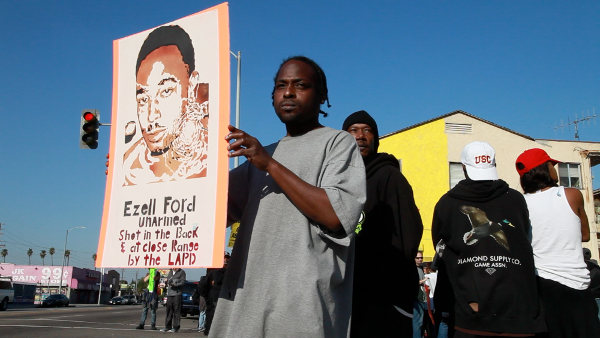
Photo: Benjamin Braddock
Saturday, January 3—About 60-70 people gathered on 65th & Broadway in Los Angeles to demand the release of Omar Abrego's autopsy, and charges be filed against police who murdered Ezell Ford and Omar Abrego. Abrego, a 37-year-old Latino, was beaten to death in August by the LAPD. Just nine days later, Ezell Ford, a 25-year-old Black man, was killed by police—at 65th and Broadway, just four blocks from where the pigs murdered Abrego. On December 29, four months after they killed Ezell Ford, the LAPD finally released the autopsy—which showed that Ford, who was unarmed, was shot three times, including once in the back. (See "Autopsy Report Released: Ezell Ford Was Shot in the Back at Close Range") The LAPD has still not released the autopsy on Omar Abrego.
Protest against police murders of Omar Abrego and Ezell Ford, Los Angeles, January 3, 2015. Photos: special to revcom.us/Revolution


At the protest, there were people who have been in the streets over the last month against police murder of Black and Latino people, as well as people for whom this was their first or second protest. There were people from the neighborhood who joined in. A rally kicked things off, with the theme of unity—unity between Black and Latino people, and unity among all those standing up to police murder. Many organizations spoke, as did the father of Carlos Oliva, murdered by police in 2013.
The march started where Ezell Ford was shot in the back and went past the spot where Omar Abrego was beaten to death by police, then continued onto a main thoroughfare and came back around to where it started. Along the route, police had pulled over a man in a car and put him in handcuffs in the back of the police car. The marchers all stopped and began chanting "let him go," pulling out their cell phones to video the police, and blowing whistles. After a standoff for several minutes, the march continued back to 65th & Broadway, where everyone was called on to continue to take to the streets, including joining and supporting the Black Lives Matter group that has been camping outside LAPD headquarters for five days demanding the cops who killed Ezell Ford be fired and charges filed. And an announcement was made about the police murder of Mayra Cornejo on New Year's Eve in Compton—family members say she was trying to protect her children at the time she was shot by LA County sheriffs, and are demanding answers about why she was killed.
Permalink: http://revcom.us/a/368/taking-bob-avakian-and-cornel-west-dialogue-to-a-new-years-eve-party-en.html
Revolution #368 January 5, 2015
Taking Bob Avakian and Cornel West Dialogue to a New Year’s Eve Party
January 5, 2015 | Revolution Newspaper | revcom.us
From a reader, January 1, 2015:
Two of us from Revolution Books got to go to a New Year’s eve party hosted and attended by a crowd of mainly1960s era activists (anti-war, environmentalists, etc.). It was a welcoming and communal atmosphere with a band performing live music, among which were “Across the Borderline” and “Imagine,” and also some dance music to bring in the New Year. Many were eager to engage on the big questions of revolution and communism.
A number of these party goers expressed real disgust with the way the world is, and said they were glad to meet and talk with us at this. The host let us set up a small book table with copies of Revolution and fundraising packets for the November 15 Cornel West and Bob Avakian dialogue. Many put on the sticker we brought of “No New Year Under the Old System. We Can’t Breathe.”
We learned a lot, including from responses to the historic Dialogue that a number of people there had heard on KPFK. Pacifica radio KPFK had been airing the whole 4-hour Dialogue by running one-hour segments that began December 29. The last hour was to play on January 1 itself.
One such KPFK listener was a 6th grade teacher who said she “loved BA’s sense of humor! He is telling you all this shit but it’s not doom and gloom. He has a subtle sense of humor about the pitfalls of capitalism. He makes it understandable.” I think that as an educator, she appreciated BA’s ability to break down complex concepts so they are accessible to a very broad audience.
I asked her thoughts on what he said about revolution, and she said she thought “it’s the only way”—but added it’s not completely clear in her mind how it would happen, though she expressed being “definitely anti-capitalist.”
Like a number of others I talked to there, she made the point of being for non-violence. Yet because one of her relatives had volunteered to fight fascism during World War II (i.e., fight against the Franco regime in Spain), she understood you may not be able to avoid it. For several of these folks, Chris Hedges and Jim Wallis are reference points.
She thought that “revolution may be frightening if the wrong people get in charge.” She felt strongly that you had to discard the word communism because of all the negative views of it, which led us to a brief exchange about the interview with Raymond Lotta on “The Communist Revolution and the REAL Path to Emancipation: Its History and our Future.”
A friend of hers, also a teacher, was interested in the Lotta interview as he was even more insistent that there are “people with agendas where once they get power, they will exhibit the animal farm syndrome.” He felt that “you can’t have just one approach” and thinks “the RCP’s view is just part and parcel of a puzzle.” We didn’t have the chance to explore further what he meant by all this.
One person simply said of hearing the Dialogue that she “loved what BA was saying when he called them ghouls. That’s how I feel. He is telling the truth.” She was very angry at the epidemic of police murders of Black and Latino people, but also told me the story of her late husband, who was white, being shot and killed by the Berkeley police in the late '60s when he was walking on a street near student protests.
One activist (with a friend who is also listening to the KPFK broadcast) said he has met the RCP at protests in different cities, and noted warmly that we are “boisterous.” As an environmentalist, he felt “change has to happen, things are really bad and we are at a point of no return.” He said he “prefer[s] non-violent change....” He thinks capitalism can be reformed, maybe through things like food riots, boycotts, voting etc., and that while communism has a good critique of capitalist system, the youth are more inclined towards anarchism than communism. Someone else thought any successful revolution involves coalition of different sections of society including students, workers, faith community and others and welcomed the dialogue in this light.
One interesting conversation was with someone who works with Vets for Peace and with the alternative press, and is also a homeless activist. He was viscerally upset about the state of the world and especially the treatment of the homeless people, how so many people's lives and humanity are destroyed. He relayed his interesting life story, including a relative who had lived in China before the communist revolution and observed the many “little white bundles in the gutter every morning” (dead/starved babies) and how he understood “that’s why they had a revolution.” He has checked out some of BA before, and felt if changing the horrible world meant going where BA is leading things, he’d be willing and open “to go there.”
These exchanges made me think of a comment from another comrade that the question of what social system is objectively being posed for many people. Some of these folks are not only searching for, and working out, possible solutions to the horrors of this system, but also are striving for different values—to be different kinds of people than the dog-eat-dog mentality fostered by this capitalist system. One young college grad from Oregon captured this in wanting to check out the CD of the 2012 interview of BA by Cornel West, with BA’s “All Played Out” and “2014 New Year Message” tracks. She said she hates how people in this country live off the backs of others in the world, and she does alternative farming as a way to feed people without profiting because she “does not believe in slavery in any form and don’t see making money as a way to become legit in life.”
Permalink: http://revcom.us/a/368/strategic-thoughts-on-building-the-movement-for-an-actual-revolution-that-breaks-all-the-chains-en.html
Revolution #368 January 5, 2015
Confront the Anti-Abortion, Woman-Hating Fascists and Reach Out Everywhere to Get Others to Do the Same!
Strategic Thoughts on Building the Movement for an Actual Revolution That Breaks ALL the Chains
January 6, 2015 | Revolution Newspaper | revcom.us
In just over two weeks, hundreds of thousands will march in Christian fascist woman-hating processions on both coasts in opposition to a woman’s right to abortion and even birth control. These people will mobilize to make even further vicious gains in forcing women back into open subordination to men and into the position where women have no access to abortion or even birth control. They are fighting for a situation where women have no choice but to bear children against their will, or to risk their lives or go to prison for attempting to self-abort.
It is long past time that people stand up powerfully right in the face of these fascists, and bring forward and challenge many more people to join them in doing this. The whole program of hoping these woman-haters will go away on their own, of not sharply calling them out and confronting them, has been proven bankrupt. There must be a powerful pole erected that attracts those who sense this and that sharply challenges those who have not yet come to grips with this. When these fascists march, they must be opposed through powerful protest that breaks through and gets heard across the country and STOPS these fascists from carrying out their hate-fests unchallenged.
Make no mistake: forcing women to have children against their will is a form of enslavement. And all this is an integral part of a much larger and even more all-encompassing war against women that includes the epidemic of rape, the pervasive culture of vicious and cruel pornography, the hatred and shame that is fostered among women for their own bodies and sexuality, the trafficking and pimping out of women and girls, the vicious exploitation of women in the most low-paid and desperate sectors of the global economy, and more.
This must not be tolerated. Women are not bitches, hos, punching bags, breeders or sex objects. Women are full human beings! Fighting this assault on women is an urgent and great need.
It is very good that Stop Patriarchy has called for people to resist, confront, and counter-protest these fascist marches. The demand for “Abortion On Demand and Without Apology!,” their call to “STOP the War on Women,” and their spirit of defiantly confronting head-on the woman-haters need to be spread and built for boldly throughout society. Everyone who is outraged by this whole program of woman-hating and forced motherhood, and everyone who can be won to be outraged by this, must be part of making these protests as powerful as possible. These counter-protests are a key juncture right now in building up the all-around fight for the complete liberation of women. (See box with protest info.)
And while many can and must be won to take part in this from a very broad range of perspectives, for our part, the movement for revolution must take this up as a key part of preparing the ground, preparing the people, and preparing the vanguard—getting ready for the time when millions can be led to go for revolution, all-out, with a real chance to win.
This is true for two fundamental and interrelated reasons:
First, if we are not fighting—and leading huge sections of society, including those who catch the hardest hell every day under this system to fight—for the complete liberation of women as a key part of this preparation, we will not be making the kind of revolution that can lead to lasting emancipation for anyone. Everyone must understand: it is not possible to achieve lasting liberation for anyone while keeping one half of humanity (women) enslaved to the other half (men).
Second, there is a deep well of outrage against the oppression of women that must be tapped into and called forth as a major propeller of the revolution we need. The potential for this was palpable in the thunderous and deeply felt response to Bob Avakian at Riverside Church when he called on people to imagine a world where women could hold their heads high and walk down the street without ever fearing to look any man in the eye, or ever again be brutalized, degraded, or demeaned. Unleashing this fury is a strategic task right now as we fight to get in position to make a revolution, and it remains strategic even after the seizure of power, as the struggle must be carried forward under socialism to uproot every vestige of oppression, not just in one country but all over the world.
Both of these dimensions are spoken to powerfully in the following quote from Bob Avakian:
You cannot break all the chains, except one. You cannot say you want to be free of exploitation and oppression, except you want to keep the oppression of women by men. You can’t say you want to liberate humanity yet keep one half of the people enslaved to the other half. The oppression of women is completely bound up with the division of society into masters and slaves, exploiters and exploited, and the ending of all such conditions is impossible without the complete liberation of women. All this is why women have a tremendous role to play not only in making revolution but in making sure there is all-the-way revolution. The fury of women can and must be fully unleashed as a mighty force for proletarian revolution. (BAsics 3:22)
With all this in mind, a few thoughts on key sectors of society and how revolutionaries should be mobilizing for these protests.
Take this to those this system has cast off. Revolutionaries should take this out boldly to those who catch the hardest hell every day under this system. Every time revolutionaries have done this in the past we have found tremendous support—as well as a lot of confusion that needs to be struggled through. Huge numbers of Black and Latino women have been harassed and shamed for seeking out abortions. Many have had their lives destroyed by being burdened by children they were not ready for or did not want. All this is a great weight that must be broken and we must work to find the ways for their outrage against this to be felt in these protests and going forward. Men, too, must be struggled with to take up this fight now as an integral part of winning any kind of real liberation. Banners that get signed supporting abortion rights and opposing slavery in every form, video statements from these masses, as well as contingents of people wearing the REVOLUTION—NOTHING LESS! shirts at the actual protests are a few concrete ideas of how this section of people can be mobilized to be part of going right up in the face of these woman-haters when all eyes will be on them.
Take this to the students. A real fight must be mounted to bring forward a new generation that is willing to FIGHT for the emancipation of women and that understands that this emancipation MUST be fought for and will never come through voting, “incremental progress,” “individual empowerment,” or any such stuff. Revolution Clubs and others should go out very aggressively to high school and college students, getting out fliers, doing dramatic street theater, speaking in classrooms, involving those they meet on the spot, and in many other creative ways winning growing numbers of students to take part in—and to mobilize others into—these protests. The spirit of students stepping out against police murder, against rape and sexual assault, against anti-LGBT bigotry and other new stirrings should be united with and fanned further. Sticker days—where hundreds of students are mobilized to wear Abortion On Demand and Without Apology stickers on the same day—should be organized that get people talking, break the isolation, and set new terms around abortion rights as well as around the full liberation of women. Powerful contingents of students should be mobilized to join in confronting the Christian fascists in the streets and this should mark a real leap in the strategic fight for this new generation.
Take this to everyone who has been in the streets and the millions more like them. Think of the tens of thousands who have stepped so boldly and so beautifully into the streets against police murder and the whole slow genocide of Black and brown people at the hands of the state. They have broken out of the stifling and deadly routine in their behavior and in their thinking they are open to many new things that previously they hadn’t even considered. This is the time to go very boldly to all of them—and the millions more like them—who can be won to see that we must oppose slavery in every form. Where the question of women’s liberation—and of these January protests in particular—has been taken out among these folks, there has been a broad and enthusiastic reception. The challenge must go out even further to the artists, young professionals, poets, '60s people, and the rest to bring that same spirit of defiance and determination into the fight against every form of oppression, including right now against the enslavement of forced motherhood.
Get into and get out broadly the compendium Break ALL the Chains! Bob Avakian on the Emancipation of Women and the Communist Revolution. As we do all of this, all of us—especially the Revolution Clubs, but not only them—should be getting deeply into and getting out broadly both the above quote from Bob Avakian (“You can’t break all the chains but one...”) and the entire compendium on women’s liberation that features that quote. In this compendium, Bob Avakian brings together a tremendous visceral hatred for the oppression of women as well as profound theoretical breakthroughs as to the roots and the abolition of this oppression that is essential to achieving human emancipation. He critically examines the best of the previous communist understanding of this question and synthesizes this together with what can and must be learned from other forces who have fought for women’s liberation and sets forth an even more radical framework for both renewed struggle on this front and further theoretical work that is needed. He breaks things down in a very basic way that everyone can understand and puts a deep challenge that everyone who wants liberation must take up. Getting into all this ourselves, and popularizing this very broadly among others, is a key part of bringing alive the revolution and the revolutionary leadership necessary to raise people’s sights and prepare for an actual revolution.
Unite all who can be united to confront the woman-haters. As we do all of this, let's fight for and unite with others who step forward—or who can be won to step forward—from different perspectives to join with and take up this fight for the liberation of women and for these counter-protests in particular. They should be encouraged and welcomed to put forward and mobilize others to stand up from their own viewpoints even as we put forward ours and even as we together engage in principled struggle over the source of the problem and its ultimate solution.
Build organization. A key aim in all of this should be building the organization needed to actually STOP all this oppression and degradation once and for all.
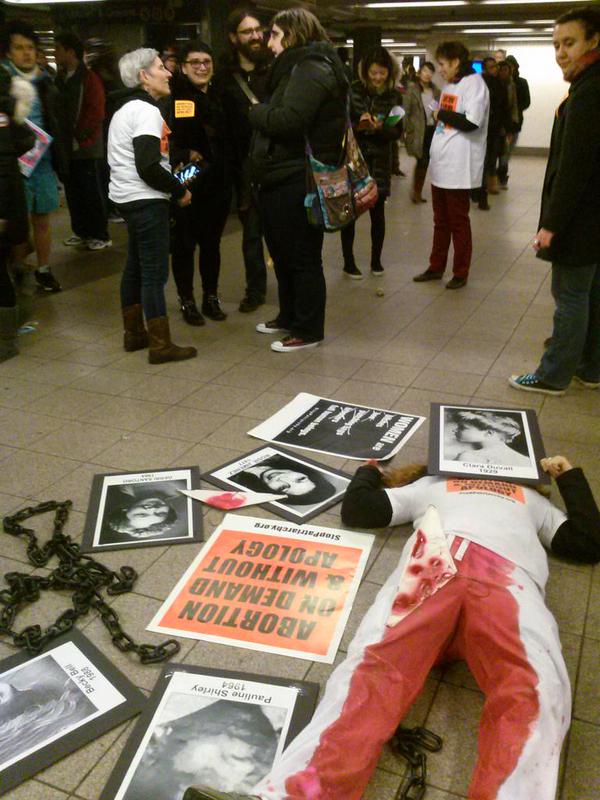
Stop Patriarchy action at Union Square subway station, New York City, January 11, 2014. Photo: @StopPatriarchy.
Stop Patriarchy must be systematically built as a real site where people who want to see this degradation and oppression STOP come together to work and fight to make that happen. This movement has to grow and become magnetic, a place for everyone, young and old but especially young in spirit, who can’t stand the relations and morality of this society and really burn to be part of bringing in something different.
And the Revolution Clubs must also grow through all this. Even as these clubs continue to s pread the work of BA and his recent dialogue with Cornel West in particular, and even as they are taking on the powers around police murder and other outrages, they should not only be building for these January protests, but strongly representing at them as the Revolution Clubs. They should be calling on and challenging others to be part of getting ready for an actual revolution, putting forward the need for others to get with the Club right on the spot and get serious about actually bringing about a revolution aimed at breaking EVERY chain on humanity.
* * * * *
There is not a lot of time between now and these fascist anti-abortion marches, but these are not normal times. Millions have begun to question things they used to just accept. A defiant spirit of resistance has sprung forward and needs to be built upon and spread. Thousands have tuned in and been exposed to the most radical and liberating vision of real revolution and total emancipation in Bob Avakian’s presentation and dialogue with Cornel West just a few weeks ago at Riverside Church. And millions upon millions are being confronted every single day by the outrageous effects of the unrelenting war against women. Let us seize the hour and go out very boldly to build for these protests in a way that prepares the ground, prepares the people, and prepares the vanguard and other forms of revolutionary organization for the revolution humanity so urgently needs.
Abortion On Demand and Without Apology!
STOP the War On Women!
Break the Chains! Unleash the Fury of Women as a Mighty Force for Revolution!
OPPOSE SLAVERY IN EVERY FORM!
Permalink: http://revcom.us/a/368/black-lives-matter-LA-encampment-for-ezell-ford-targeted-by-lapd-en.html
Revolution #368 January 5, 2015
Black Lives Matter LA Encampment for Ezell Ford Targeted by LAPD
January 7, 2015 | Revolution Newspaper | revcom.us
Since the autopsy of Ezell Ford—who was killed by the LAPD in August—was released on December 29, 2014, there have been continuing protests in Los Angeles against the police murder of Ford, a 25-year-old Black man, and others. Groups of people have marched onto a freeway and stopped traffic...taken to the streets in the south central LA neighborhood where Ezell Ford was shot by LAPD Newton Division gang unit cops just days after Omar Abrego was beaten to death by this same unit...held press conferences...staged die ins in the Crenshaw District...and more.
On December 30, the day after the release of the autopsy on Ezell Ford, Black Lives Matter LA started an encampment outside LAPD Headquarters, calling it #OccupyLAPD. Their demands include the firing of the two LAPD cops who killed Ezell Ford and the filing of murder charges against those cops by the LA County DA.
On Monday, January 5, two local leaders of Black Lives Matter LA, Melina Abdullah and Sha Dixon, tried to deliver letters with their list of demands to LAPD Chief Charlie Beck at LAPD Headquarters. They were blocked by the police who then arrested the two activists for supposedly “trespassing.” Melina Abdullah said that “we are two women who are armed with letters” and that they got arrested because the LAPD wanted to put a stop to the media attention the #OccupyLAPD encampment was receiving.
The autopsy on Ezell Ford had been hidden by the LAPD for many months. Once it became public, it showed the cops had shot Ford in the back at close range—and it also showed the improbability of the LAPD cops’ version of events (see “Autopsy Report Released: Ezell Ford Was Shot in the Back at Close Range“). However, at a press conference on the day the autopsy was released, LAPD Chief Beck said he saw nothing in the autopsy “that is inconsistent” with the version of events provided by the officers that killed Ezell. The autopsy of Ezell Ford, who was unarmed when shot by the LAPD, revealed that he was shot on his right side, his right arm, and shot in the back. The shot in the back showed a “muzzle imprint” from the gun fired, meaning he was shot at very close range. The wound in the back was fatal.
One of the women from Black Lives Matter LA who was arrested, Sha Dixon, wrote, “The people are demanding that the state stop the active war and terror they are inflicting upon our people. We have gathered to get our points across to Chief Beck and his subordinates using art, healing, love and unity. For that, they have criminalized us....” At the encampment she told revcom.us/Revolution, “The people have spoke. People are tired of being killed, harassed, kidnapped, I’m a mother of an 18-year-old Black boy, so I realize his life is in jeopardy more than a lot of ours... that’s one reason I am out here and that I will continue to fight against whatever type of repressive force they try to throw at me because I will be doing a disservice to my son if I did not.”
Black Lives Matter LA is making plans for continuing the encampment at LAPD Headquarters. Stay tuned....
Permalink: http://revcom.us/a/368/los-angeles-marching-to-demand-justice-for-mayra-cornejo-en.html
Revolution #368 January 5, 2015
Los Angeles: Marching to Demand Justice for Mayra Cornejo
January 7, 2015 | Revolution Newspaper | revcom.us
From readers:
Demanding justice for Mayra Cornejo, Compton, Los Angeles, December 5. Photos: revcom.us/Revolution
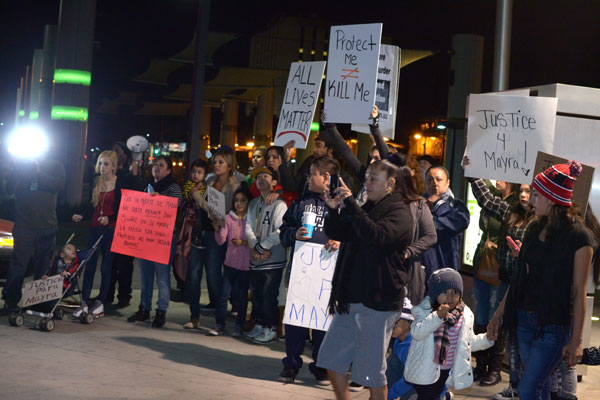

January 5—Family and friends of Mayra Cornejo gathered at the site where police gunned her down on December 31. As reported at revcom.us, family members say that Mayra was trying to protect her children from harm at the hands of her abusive husband when LA County sheriffs shot her seven times—shooting even after she fell to the ground. (See “The Senseless, Illegitimate Police Killing of Mayra Cornejo“) After marching through a nearby shopping center and train station shouting “Justice for Mayra,” the protesters marched to the front of the Compton Sheriff’s station, angrily denouncing the murdering police and demanding answers. They were supported and joined by Black people in Compton who testified to their own experiences with the police and consciously spoke to uniting Black and Latino people in the fight against police murder.
The fact that Mayra Cornejo was killed by police while trying to protect her children from sexual abuse by their father is tearing at the hearts of everyone who knew her or is just hearing about what happened. And the horror of the police ripping her life away at the age of 34 comes on top of another: In 2007, Mayra’s brother Mauricio was beaten to death by police in Ramona Gardens. Their mother has now lost two children at the hands of police. Police murder must stop!!
Permalink: http://revcom.us/a/369/awtwns-mexico-governments-political-crisis-persists-en.html
Revolution #368 January 5, 2015
From A World to Win News Service
Mexico: government's political crisis persists
January 9, 2015 | Revolution Newspaper | revcom.us
5 January 2015. A World to Win News Service. In his first state visit to the state of Oaxaca and his first public appearance in the new year, Mexican President Enrique Pena Nieto received an unexpected "welcome" from local schoolteachers calling for him to be driven from office. What was supposed to be a reboot for Pena's authority turned out to be another disaster.
-MexicoProtestDec26AP161497254905hirez-600.jpg)
Relatives of the 43 missing students from the Isidro Burgos rural teachers college march holding pictures of their missing loved ones during a protest in Mexico City, December 26. Protesters marched through the city to mark the three months since the 43 students were taken by municipal police. According to the Attorney General's report, the kidnapped students were handed over to a drug gang to be killed and then the bodies burned. Photo: AP
Pena's visit was unannounced, to avoid protests, but was to be highly publicized afterwards. His speech was to promote a strategic plan to transform the country's economy by further opening its oil and gas industry and other sectors to foreign capital, along with an education "reform" whose content is symbolized by the attack on and disappearance of 43 teachers' college students, rural youth whom the authorities believe should be beaten down, not educated.
The Oaxaca teachers climbed the barriers surrounding the industrial facility where he was to speak and clashed with police in an effort to prevent his entrance, which took place only amid tear gas and stones.
-ProtestNietoWhiteHouseAP572847263704hirez-600.jpg)
Protest against Mexican President Enrique Peña Nieto's visit to the White House in Washington, January 6, 2015. Photo: AP
About 150 family members and fellow students of the disappeared Ayotzinapa youth travelled from the southern state of Guerrero to the federal capital on 24 December, Christmas Eve, declaring that they would not celebrate the holidays or allow Pena to do so with his family until the government produced their sons alive. A long line of riot police and barricades prevented them from entering the presidential residence, Los Pinos. Standing outside in a heavy, cold rain, they warned that the holidays and the new year would not see them stop struggle for justice. They returned to Los Pinos on 26 December and then again 31 December.
These protests followed a growing wave since the students disappeared on 26 September, including marches of tens of thousands of people in the capital and several cities in Guerrero on 8 November. A ceremonial door of the presidential palace, originally built for the Spanish conqueror Hernan Cortez, was set on fire. There was an angry mass assault on local government buildings in the Guerrero state capital of Chilpancingo on 14 December.
In December more evidence emerged linking the police detention and subsequent disappearance of the students to the highest levels of the federal government. These facts go against the official narrative, repeated by much of the world media, that the mayor of the city of Iguala sent his police to attack a caravan of students on their way home to Ayotzinapa after a protest because he was afraid that they would spoil an event hosted by his wife, Maria de los Angeles Pineda. The two were arrested some months ago and now she has been indicted as the “mastermind” behind the disappearance, in connection with her brothers, allegedly leaders of the Guerreros Unidos drug gang, to whom the police are said to have turned over the students for execution.
-DefacedNietoMexCity_Dec6_AP297543228843hirez-300.jpg)
A protester holds a defaced image of Mexico's President Enrique Peña Nieto that reads in Spanish, "We want them alive" in Mexico City, December 6. Photo: AP
Leaked government documents from an initial investigation (later abandoned) and a scientific investigation revealed three key points:
1) Federal police and authorities were following the students' movements that day in real time through a local command post and coordinated with the police in the operation against them. Sixteen federal police were on the scene. According to the report in the magazine Proceso, federal authorities "orchestrated" the attack.
2) The students, preparing for a trip to the capital for a national protest, arrived in Iguala more than an hour after the mayoral event was over. It has also come out that the students were not entering but leaving town when their buses were stopped. So the official fable about the motives behind the attack don't hold up.
3) A team of scientists looking into the affair contested the federal attorney general's claim that it is impossible to identify bodies said to be those of the students, even by DNA traces, because of a massive fire. Their report concluded that there is no evidence of a fire capable of such destruction at the rubbish site where they were supposedly dumped. This means the question of what happened to the students is still open, and the authorities are hiding the truth. (See "Iguala: la historia no oficial" in Proceso nos. 1989 and 1990, excerpts posted online on 13 December 2014, and, in English, the UK Guardian summary of the leaked documents and scientific report, 16 December.)
These and other facts have not been totally unknown before; the point is that a political situation is developing in which a broad section of Mexican society is taking note of information previously thought almost unbelievable because of the radical implication that the whole state structure and its institutions from top to bottom have blood on their hands.
Aurora Roja, the publication and website of the Revolutionary Communist Organisation (OCR) of Mexico, has put this event in the context of previous federally-led or federally-covered up attacks on the Ayotzinapa students; the concerted cover-up of responsibility for the attack by the three major political parties and state institutions, including the judiciary and army as well as the presidency; and above all, the "war against the people" being waged by the government, through its armed forces and security forces and the various drug gangs associated with different state entities. This effort to prevent rebellion has now sparked the most powerful rebellion Mexico has seen in decades and a golden opportunity to build a movement for making a revolution.
As Aurora Roja has demonstrated, drawing on many investigations by journalists, human rights researchers and studies by oppositional organizations, this “war against the people” has been waged in coordination with the U.S. government and armed forces. The U.S. government has threatened sanctions against Mexico because of its failure to protect endangered sea turtles, but continues to aid, arm and coordinate with the Mexican government after about 100,000 people have been massacred since the previous president launched a “war on drugs” in 2007.
The White House denied news reports that U.S. President Barack Obama planned to discuss these massacres at their scheduled meeting in Washington 6 January. Although a spokesperson acknowledged receiving a letter from Human Rights Watch about "generalized torture" and widespread "extrajudicial executions by security forces" under Pena's government, documenting 149 cases of forced disappearances, he said that any discussion of "human rights" between the two presidents would be in the context of security cooperation, according to Proceso (5 January). The U.S. has provided more than two billion dollars for Mexico's "war on drugs".
The International Crisis Group (icg.org), a think tank set up to advise the U.S. and European governments, warns, "Mexico is facing a crisis of legitimacy." It cites polls showing that most people now have little respect for the army, police, governing parties and judiciary (in descending order of disrespect) – and "democracy in Mexico." That is a system, says Aurora Roja, in which elections are the adornment of "a criminal and illegitimate state" that just happens to be both a vassal and a weak link for the rulers of the U.S.
www.huffingtonpost.com/2014/12/14/missing-students-mexico_n_6321866.html [re: report in Proceso]
blog.crisisgroup.org/latin-america/2014/12/19/mexico-upheaval-and-paralysis/ [re: International Crisis Group quotation]
-Dec26_Girl_43_AP32891697004hirez-600.jpg)
Protester holds up her red-painted hands with the number 43 written on them, referring to the 43 missing students from the Isidro Burgos rural teachers college in Mexico City, December 26. Photo: AP
A World to Win News Service is put out by A World to Win magazine, a political and theoretical review inspired by the formation of the Revolutionary Internationalist Movement, the embryonic center of the world's Marxist-Leninist-Maoist parties and organizations.
Permalink: http://revcom.us/a/369/awtwns-morocco-students-battle-police-regime-en.html
Revolution #368 January 5, 2015
From A World to Win News Service
Morocco: Students Battle Police, Regime
January 9, 2015 | Revolution Newspaper | revcom.us
5 January 2015. A World to Win News Service. Law students at Mohammed I University in the northeastern city of Oujda in Morocco beat back police and occupied the campus on 22 December. Morocco's campuses have repeatedly been a battleground, especially since last April when radical students battled Islamists at the highly politicized and polarized university in Fes. At that time the Islamist government serving under the authority of King Mohammed VI declared the student movement a problem of "public safety," authorized the police to enter university facilities (previously off-limits to them) and restricted campus demonstrations.
The Oujda students had gone on strike, set up literature tables and blocked access to a law school building in a protest against entrance exams and procedures that admit only 240 students to a masters program out of the 900 who have completed the undergraduate courses. The police entered in force, charging in on numerous vehicles and trying to surround the open area occupied by the students, but appear to have been forced to retreat by youth who stood their ground. Despite encirclement of the campus by security forces the protests spilled over to several neighbourhoods in Oujda. (For footage of this pitched battle, see Dalil-rif.com)
This university has been known for radical anti-government opposition, and Education Minister Lahcen Daoudi denounced the students harshly. He claimed that their real political target was the regime, and that having armed themselves "with stones and onions to make tear gas bombs," they had injured a hundred police. Students followed up with a sit-in at the university.
The authorities have singled out the organization Voie Democratique Bassiste (Democratic Path – the Base) for attack in connection with these student protests. Many students allegedly associated with it have been arrested over recent years. Imprisoned student leaders, both those long awaiting trial and those already convicted, have launched repeated hunger strikes – often subsisting on sugar and water and sometimes not – for recognition of their rights as political prisoners and against prison abuses, and demanding accelerated trials and authorization to pursue their studies in jail.
One of them was Mustapha Meziani, who died last 15 October after a 72-day hunger strike in Fes. Abelhak Atalhaoui, in Essaouira prison, waged a long hunger strike in October. More recently, Aziz Elkhalfaoui, a leader of the 20 February Student Movement, arrested on 4 September 2014 and still awaiting trial in Marrakesh, went on hunger strike on 3 December. He was reportedly in a coma and hospitalized on 15 December. Redouane el Aaimi, arrested at the same time and also on hunger strike since 3 December in Marrakesh, is reportedly very ill.
A week later these two young men were joined in their action by two other prisoners, Aziz Elbour and Mohamed Elmouden, serving three-year sentences in the southern Morocco city of Tiznit.
The authorities have blacked out news of these prison protests in the media, and we have learned nothing more since late December.
A World to Win News Service is put out by A World to Win magazine, a political and theoretical review inspired by the formation of the Revolutionary Internationalist Movement, the embryonic center of the world's Marxist-Leninist-Maoist parties and organizations.
Permalink: http://revcom.us/a/369/awtwns-thinking-about-trayvon-martin-an-egyptian-artist-looking-at-the-world-en.html
Revolution #368 January 5, 2015
From A World to Win News Service
Thinking about Trayvon Martin, an Egyptian artist looks at the world
January 9, 2015 | Revolution Newspaper | revcom.us
5 January 2015. A World to Win News Service. A Cairo art gallery recently held a show of work by Egyptian artist Mona Marzouk called Trayvon, named after the African-American high school student,Trayvon Martin, murdered in Florida (U.S.) in 2012. In a newspaper interview, she says she obsessively followed the case and trial of the vigilante George Zimmerman, who stalked and shot the 17-year-old. "The first thing Zimmerman said to police," Marzouk says, "was 'he's Black.'... I thought it was important to express what happened to this young man for no reason."
Marzouk explains that the surreal trial, in which facts were uncontested and yet the only result was to ratify the "right" to kill Black youth in America, reminded her of the way that Egyptian courts similarly turn right and wrong upside down. All over the world, she says, "people are looking for justice and they [are] in jail." She might have been thinking of the last months in her own country, where the American-favored former president, general Hosni Mubarak, was acquitted of murder, even though he ordered the killing of many hundreds of demonstrators, while youth prominent in the movement that led to his overthrow were sentenced to prison for holding public protests against his successors.
The work in this show, however, is not about any particular case or indeed any particular injustice. A bright yellow wall swarms with black, sharply outlined silhouettes that recall real objects, but rather than representational, they are suggestive, working on many layers of reference and emotion at once. Helicopters, a recurring theme and a symbol of ubiquitous state violence throughout the world, bring to mind birds of prey or malefic insects. Guillotines, electric chairs and nooses combine with grand pianos and clawed creatures. Versions of the American flag replace the stars with terrifying but indeterminate beasts and objects that suggest empires and executions throughout the ages. Grim castles meld minarets and cathedrals, hinting at Pharaohs, Romans, Ottoman and European potentates. A turreted tower gulps down the setting sun as if it were an egg yolk. These architectural structures, like her innumerable helmets, project political dominance and male authority—and hurt. In "Curse Carriers," a giant shark-jawed monster with an airplane body on a tripod confronts a crab-like creature that could be a tank with minarets. The images are razor-edged, frightening and painful to the viewer's very soul.
See:
http://gypsumgallery.com
www.dailynewsegypt.com/2014/10/22/trayvon-martin-inspires-gallery-display-zamalek
www.jadaliyya.com/pages/index/20404/mona-marzouk's-'trayvon'-takes-inspiration-from-eg
A World to Win News Service is put out by A World to Win magazine, a political and theoretical review inspired by the formation of the Revolutionary Internationalist Movement, the embryonic center of the world's Marxist-Leninist-Maoist parties and organizations.
Permalink: http://revcom.us/a/369/awtwns-film-the-messengers-les-messagers-en.html
Revolution #368 January 5, 2015
From A World to Win News Service
Film: The Messengers (Les Messagers)
January 9, 2015 | Revolution Newspaper | revcom.us
5 January 2015. A World to Win News Service. "Who are these people who left and never arrived"—who left their homes and families in Africa and disappeared trying to cross into Europe? Whether murdered by the Moroccan police and buried in the sand, swallowed by the sea after their inner tubes are punctured by bullets or their canoes rammed by patrol boats, or beaten to death by the Spanish Guardia Civil as they scramble up the wire fence that separates Morocco from the Spanish enclaves of Ceuta and Melilla, they have been devoured by the terrifying abyss that divides the world into the lands of plenty and the lands where much of that plenty comes from. For the makers of this documentary, Helen Crouzillat and Laetitia Tura, these people are not so much migrants as messengers.
The number of those who died trying to cross that abyss is uncountable, but it is not acceptable that they be uncounted, that they remain without a name, buried in bulldozed pits in the sand or the dark, dark sea. No one, not even their closest family, knows what became of them. The filmmakers sought out their identities and their message in the now-empty shelters they built to survive in the sun, from fishermen and others who witnessed their death, and above all from survivors, who explain how they gathered and mourned—and still mourn—for fellow refugees with whom they had no language in common, whom they knew only as they ran for a train in the night and never saw clearly except for in the flash of a spotlight, whom they buried if they could, doing their best to put a name over the grave, or carried them carefully in memory.
One thing that makes the survivors' testimony so powerful is that they know and we know that they are speaking for the disappeared. "We are people who have been turned into things," one tells us. When human beings impose this kind of reign of terror on other human beings instead of allowing their talents to flourish, "this is not a world of construction—we are destroying each other." "We exist, we are young and we want to work," says another, a simple fact made piercing because many people want to ignore their existence and others are employed to bring their existence to an end.
The Guardia Civil hang up containers of water for birds as if mocking the thirsty people waiting in the desert scrub brush for their chance to leap into the abyss, the live or die moment that brought them here. The head of the Guardia explains, "No wall can stop a man who has come a thousand kilometres"—but if some are killed, that, too, is "a wall"—it tells everyone who might want to climb that wall, or swim around it, or venture across the sea that encloses Europe: this is what can happen to you. The Spanish police save some swimmers, drown some and leave many to fend for themselves after their little boats capsize. The Moroccan police who kill these migrants inland and at the shore work for Spanish interests just as the king of Morocco himself is a vassal of the French and Spanish former colonialists and European capital. These killings are rational from the point of view of the interests of the European capitalist classes: they regulate the number of migrants and eliminate the weakest to feed the grinding global system. The unacceptability of this system and its division of the world is the message these migrants are bearing.
Les Messagers, a 70-minute film in French, Arabic, English, Pulaar and Spanish (subtitled in French or English) won the best documentary award at the Verona (Italy) African Film Festival and played at 14 film festivals in Argentina, Belgium, France, Italy and Uganda in 2014. Extracts are available on Vimeo.com. It can be ordered for public screenings large and small from the distributor, primaluce.fr.
Also see the project "Je suis pas mort, je suis la" on the Website of the film's cinematographer, the photographer Laetitia Tura (laetitiatura.fr).
A World to Win News Service is put out by A World to Win magazine, a political and theoretical review inspired by the formation of the Revolutionary Internationalist Movement, the embryonic center of the world's Marxist-Leninist-Maoist parties and organizations.





































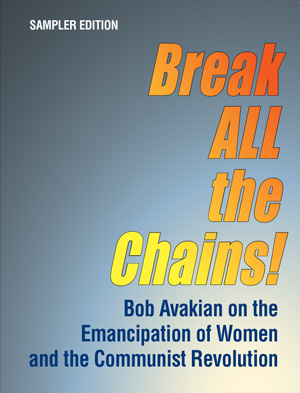




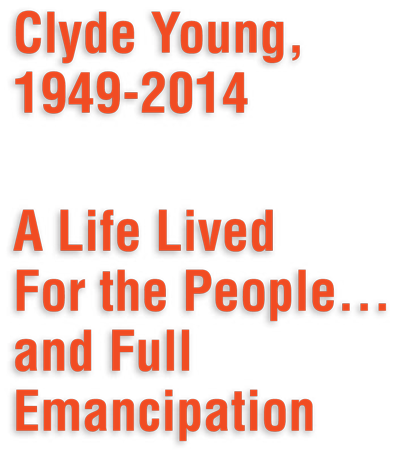
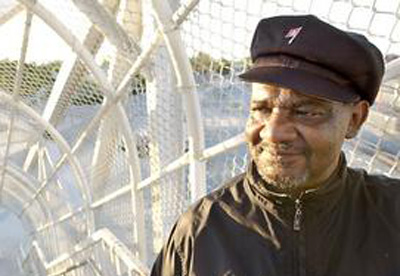












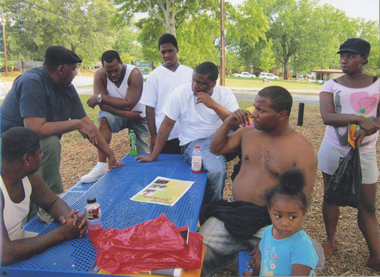
























 1
1 2
2 3
3 4
4 5
5 6
6 7
7 8
8 9
9 10
10 11
11 12
12 13
13 14
14 15
15 16
16 17
17 18
18 19
19 20
20 21
21 22
22 23
23 24
24







-MexicoProtestDec26AP161497254905hirez-600.jpg)
-ProtestNietoWhiteHouseAP572847263704hirez-600.jpg)
-DefacedNietoMexCity_Dec6_AP297543228843hirez-300.jpg)
-Dec26_Girl_43_AP32891697004hirez-600.jpg)